Most office no solid evidence for that belief. And many have begun to relax behaviors for 'typical activities.' But, most believe the federal government is making the Covid recovery worse.
A majority are hopeful we can get COVID-19 under control in six months.
At the same time, most believe the federal government is making country’s coronavirus recovery worse. 58% know someone who has tested positive, a record. 22% know someone who has died. 68% report wearing a mask when going outside. 67% see sending children to school as a risk. 35% report going out to eat in the last week. 46% trust Biden to provide them with accurate information
about the coronavirus, compared to 31% for Donald Trump.
The 23rd installment of the Axios-Ipsos Coronavirus Index shows that a majority are hopeful we can get COVID-19 under control in six months. At the same time, however, most believe the federal government is making our country’s coronavirus recovery worse. For both of these items, and many others, attitudes are deeply divided along partisan lines. Additionally, as more parents report sending their child back to school, nearly half say their school district’s plans for the year have already changed.
Detailed findings:
1. Levels of optimism about getting the virus under control, as well as the federal government’s role in our country’s recovery, illustrate the deeply polarized views that persist about COVID-19.
- Overall, 57% of Americans are very or somewhat hopeful that the U.S. will get the COVID-19 pandemic under control in the next six months. However, Republicans are significantly more optimistic than Democrats – there is a 40 percentage point difference between the two – while Independents are more evenly split on being hopeful or not.
- Thirty-nine percent believe the federal government is making the country’s recovery from the COVID-19 pandemic better, while 60% say it is making it worse. This is similar to the current levels of trust in the federal government and President Donald Trump to provide people with accurate information about the coronavirus.
- Again, there is a substantial partisan difference. Three-quarters of Republicans (74%) say the federal government is making the country’s recovery from the pandemic better, compared to just 19% of Democrats and 32% of Independents.
2. After the Republican National Convention, levels of trust in Joe Biden and Donald Trump remain steady.
- As first reported after the Democratic National Convention (DNC), more Americans trust Joe Biden for COVID-19 information than President Trump.
- Forty-five percent trust Biden to provide them with accurate information about the coronavirus, compared to 31% for Donald Trump. These numbers are virtually identical to last week, after the DNC (46% and 31%, respectively).
3. With back to school season underway, many parents report their school district is already changing plans for the year.
- More than half of parents with a child under 18 at home report that school has started. Since last week, the number of parents saying they have sent their child back virtually/via distance learning has risen 10 points (46% now, up from 36%).
- Among parents who have sent their child back to school, either in person or online, 48% say their district has had to change its schooling plan after the year started.
- More than one in five (22%) of this same group report that there have been COVID-19 scares or outbreaks within their child’s school district since their child went back to school.
Washington, DC, August 25, 2020
In the twenty-second week of the Axios-Ipsos Coronavirus Index, we find that the coronavirus is increasingly touching every American. However, while concern remains high, Americans appear to be slowly adapting, and perceptions of risk are declining. Additionally, half of American parents report that their children have restarted school, mostly virtually at this point.
Detailed Findings
1. The toll of the coronavirus continues to climb with increasing numbers of Americans feeling the impact on their personal lives.
- Fifty-eight percent of Americans know someone who has tested positive, a new high point.
- Twenty-two percent know someone who has died. While racial differences in knowing someone who has tested positive have mostly dissipated, Black (39%) and Hispanic (31%) Americans continue to be much more likely than white (18%) Americans to know someone who has died of the disease.
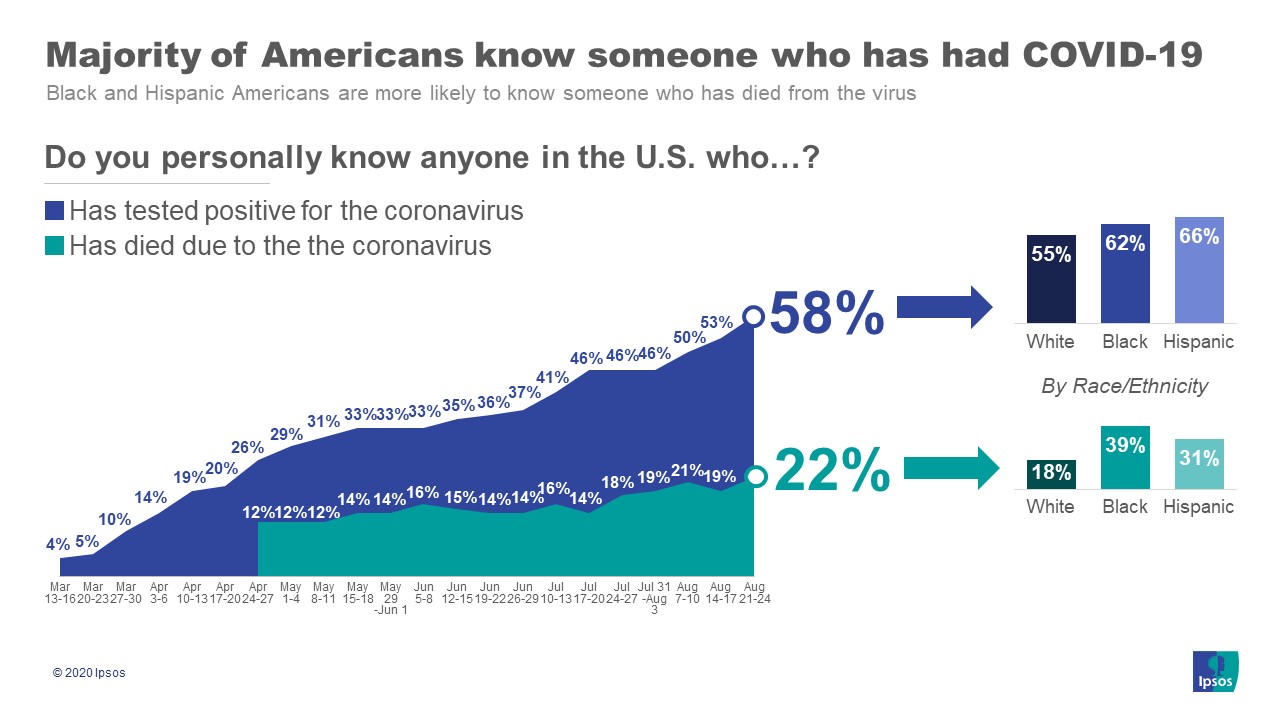
2. As the focus of American politics shifts from the Democratic to the Republican convention, Americans report being more likely to trust what Joe Biden says about coronavirus than President Donald Trump.
- Just under half (46%) of Americans trust a great deal or a fair amount of what Biden says about coronavirus. Comparatively, under a third (31%) trust what Trump says.
- Over a quarter of Americans (28%) do not trust most of what either Trump or Biden has to say about the coronavirus.
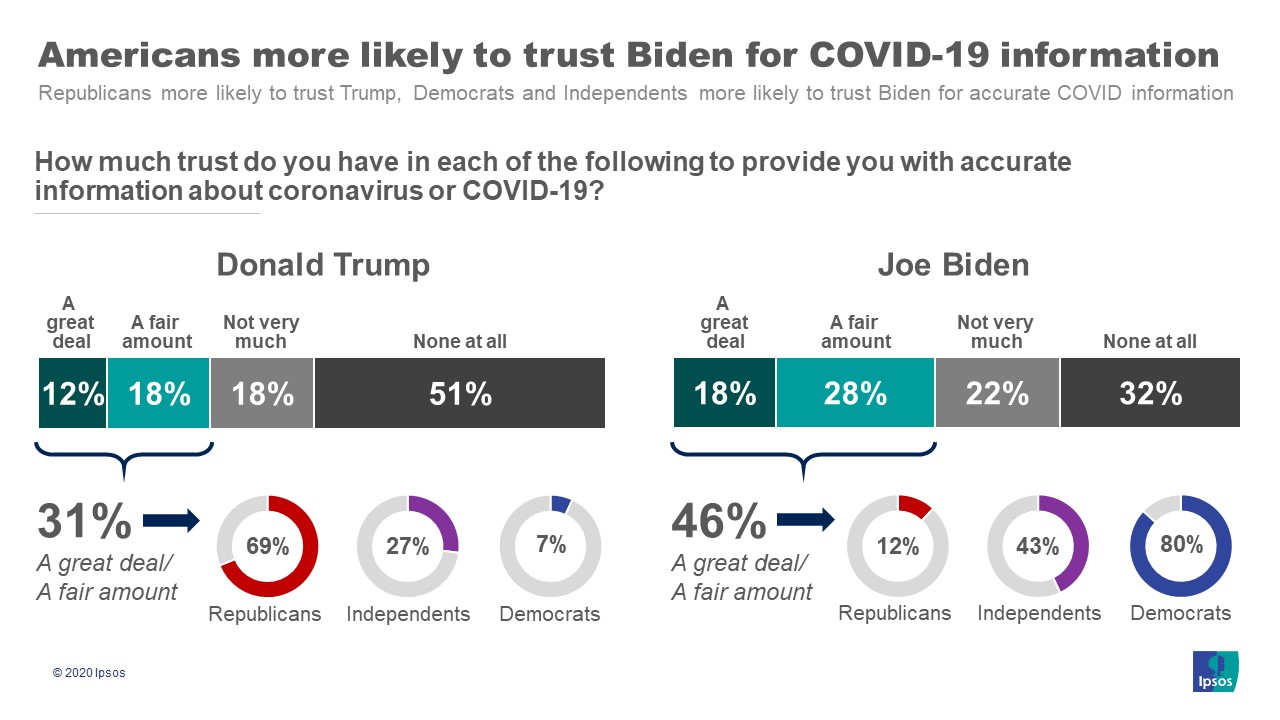
3. While American’s levels of concern with the coronavirus remain high, perceived levels of risk continue to trail off.
- Two thirds of Americans (65%) say that returning to their pre-COVID lives is a large or moderate risk, down from 71% at the beginning of August.
- Americans’ social engagement is essentially unchanged over the last week with similar numbers reporting self-quarantining (18%), social distancing (76%), going out to eat (37%), or visiting friends or relatives (46%).
- Over two-thirds (68%) of Americans report wearing a mask at all times when leaving the home.
4. Half of parents report their kids have started school, mostly remote or virtual.
- Almost a third (30%) of parents report that their children have returned to school entirely in a distance learning or virtual format.
- One in five (20%) report their children are going back in-person full-time or in a hybrid system. Parents in the Midwest (36%) and Republicans (30%) are more likely to report going back to school in-person.
- Almost all parents (80%) are at least somewhat concerned about the possibility of their child getting sick as schools return to session.
Washington, DC, August 18, 2020
Americans continue to deal with the pandemic the best they can with concern remaining high but perceptions of risk inching down in some quarters. However, as children return to school, many fear a resurgence of the virus.
Detailed Findings
1. While Americans continue to be concerned with the pandemic and see substantial risks, perceptions of some ‘typical’ activities are softening.
- Two thirds (66%) see returning to their pre-covid lives as a risk, down from 69% last week and 71% in late July.
- Fewer Americans view dining in at a restaurant as a risk (64% from 69%) or shopping retail (57% from 61%) compared to a week ago.
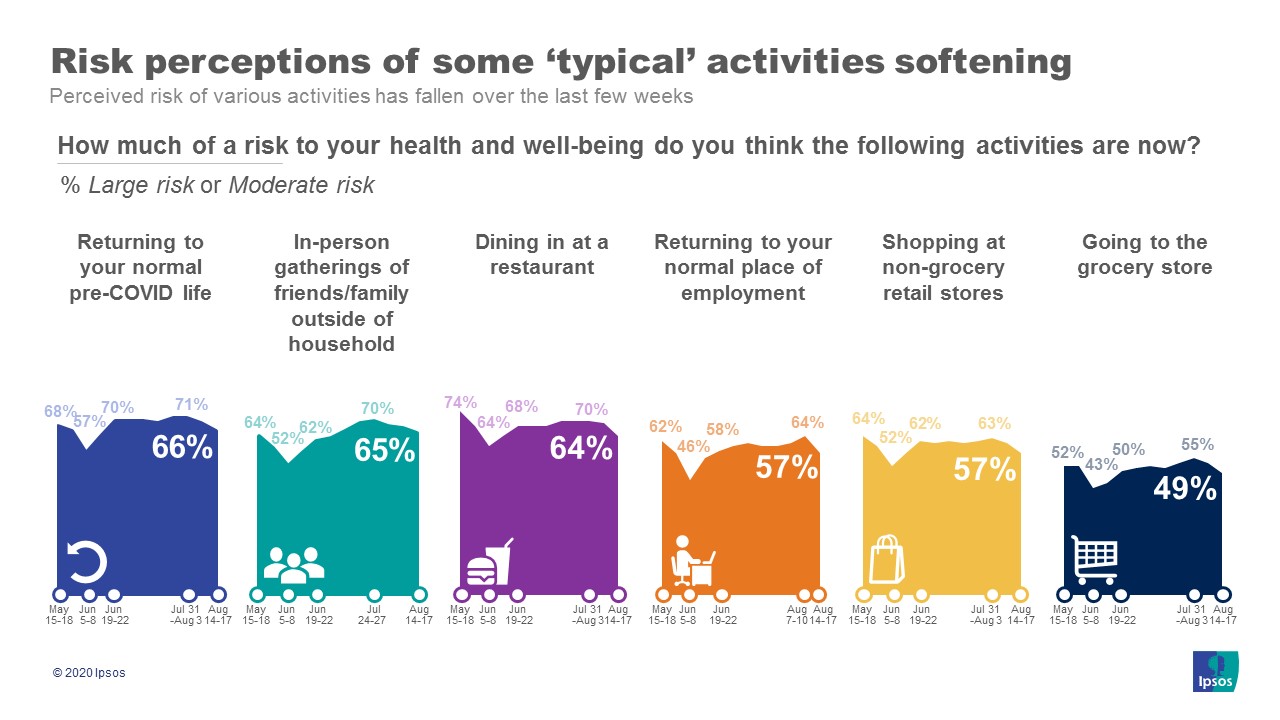
2. As the pandemic has forced people to do more shopping online, three-quarters of Americans report getting something through the U.S. Postal Service (USPS) in the last week.
- Over half of Americans (64%) were expecting a package through the USPS in the last week. About a third of those (20% of all Americans) experienced a delay or non-delivery.
- Almost one in five got medication through the mail in the last week. One in four of these (5% of all Americans) experienced a delay or non-delivery.
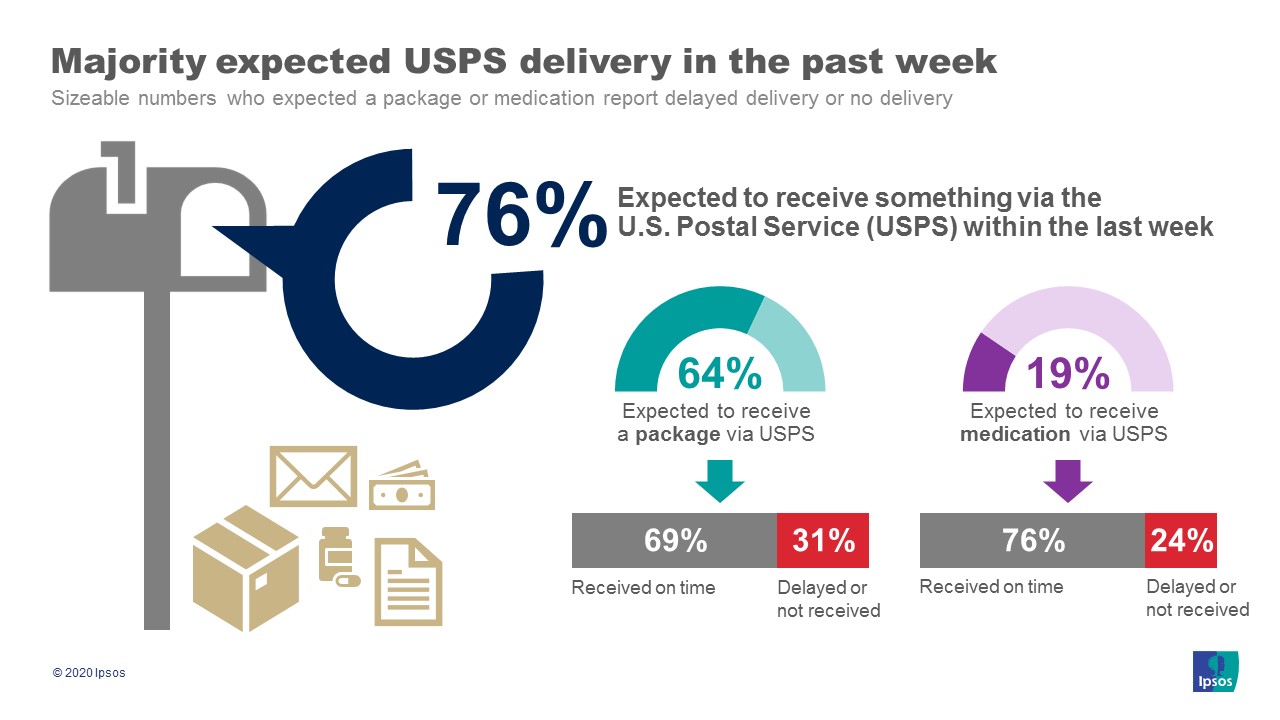
3. A third of parents have children who have gone ‘back to school’ as of last week.
- More parents report their kids in distance learning or virtual classes (21%) than in-person (11%). An additional 2% report their kids in a hybrid in-person and distance situation.
- Forty-two percent of parents report buying new clothes for their children this week and 14% report buying school supplies.
- Three quarters (73%) of Americans remain at least somewhat concerned about schools in their community reopening too soon.
4. Americans are not likely to see friends and family as a coronavirus high risk.
- Just over a third of Americans see close contacts (someone you saw often before the pandemic began; 38%) or family from outside the household (36%) as a moderate or large risk.
- People with kids in daycare or school (53%), people who travel for work (59%), or essential workers (56%) are much more likely to be seen as risks.
Washington, DC, August 11, 2020
As America passes a milestone, with one in two Americans knowing someone who tested positive and one in five knowing someone who died, the Axios-Ipsos Coronavirus Index finds America remains stuck in the struggle with the pandemic. Almost all Americans remain concerned about the pandemic and view a return to normalcy as a significant risk while more than a third of the workforce continues to work remotely. But confidence in our leaders to chart a path forwards appears to be lacking with fewer than a third of the country trusting the federal government and only half trusting state governments.
Detailed Findings
1. Americans are concerned about schools driving the new spread of the coronavirus as a quarter of parents report their kids ‘returning to school’.
- Almost three-quarters (73%) of Americans are concerned about schools in their community reopening too soon.
- A quarter of parents (24%) report their children have restarted school. Most of them (68% of those back to school, 17% of all parents) report that their children have returned to entirely distance-based virtual classes. Only 20% (5% of all parents) report their kids returning entirely in-school with an additional 12% (3% of all parents) reporting a mix of in-person and virtual.
- A third of parents report buying new clothes (36%) or school supplies (35%) for their kids in the last week.
- Two-thirds of parents (67%) see sending their children to school as a large or moderate risk.
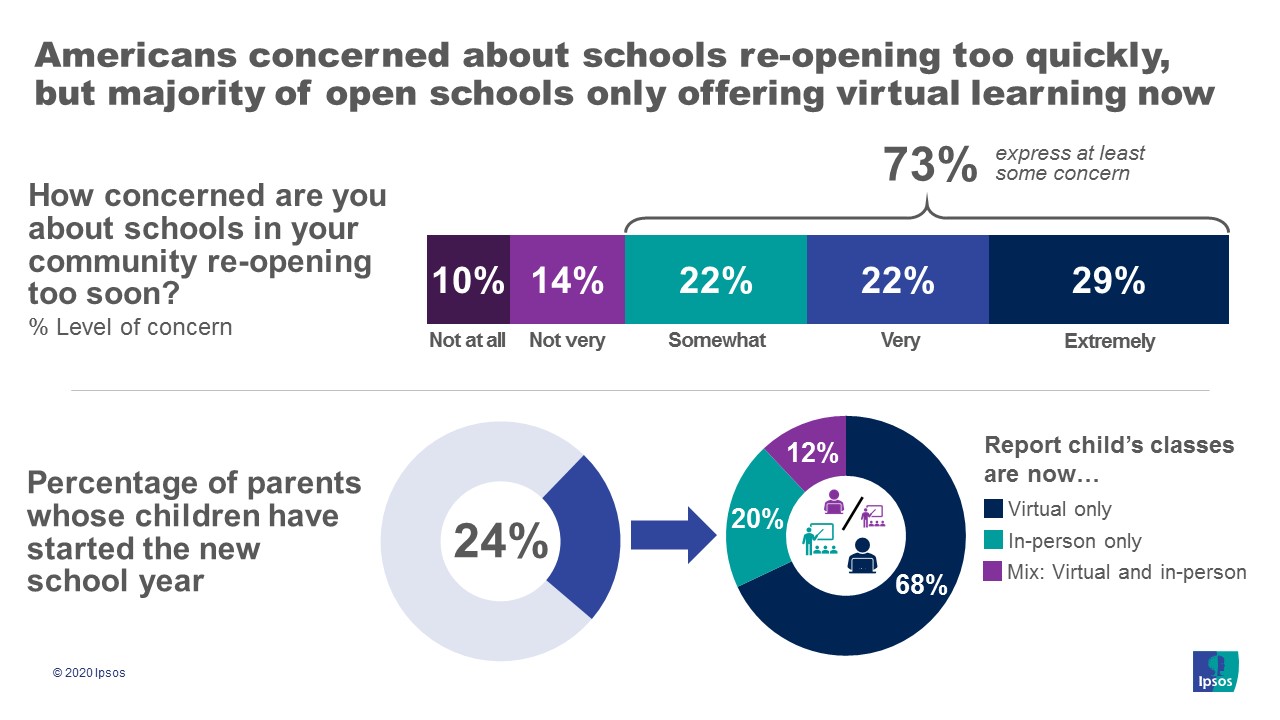
2. Half of Americans now know someone who has tested positive for the coronavirus and 21% know someone who has died.
- Half of Americans (50%) report knowing someone who has tested positive. This has climbed from 4% in mid-March when we started this index.
- A quarter of Americans (25%) know someone who has tested positive in their community.
- One in five (21%) Americans know someone who died, 42% of whom report losing a family member or close friend.
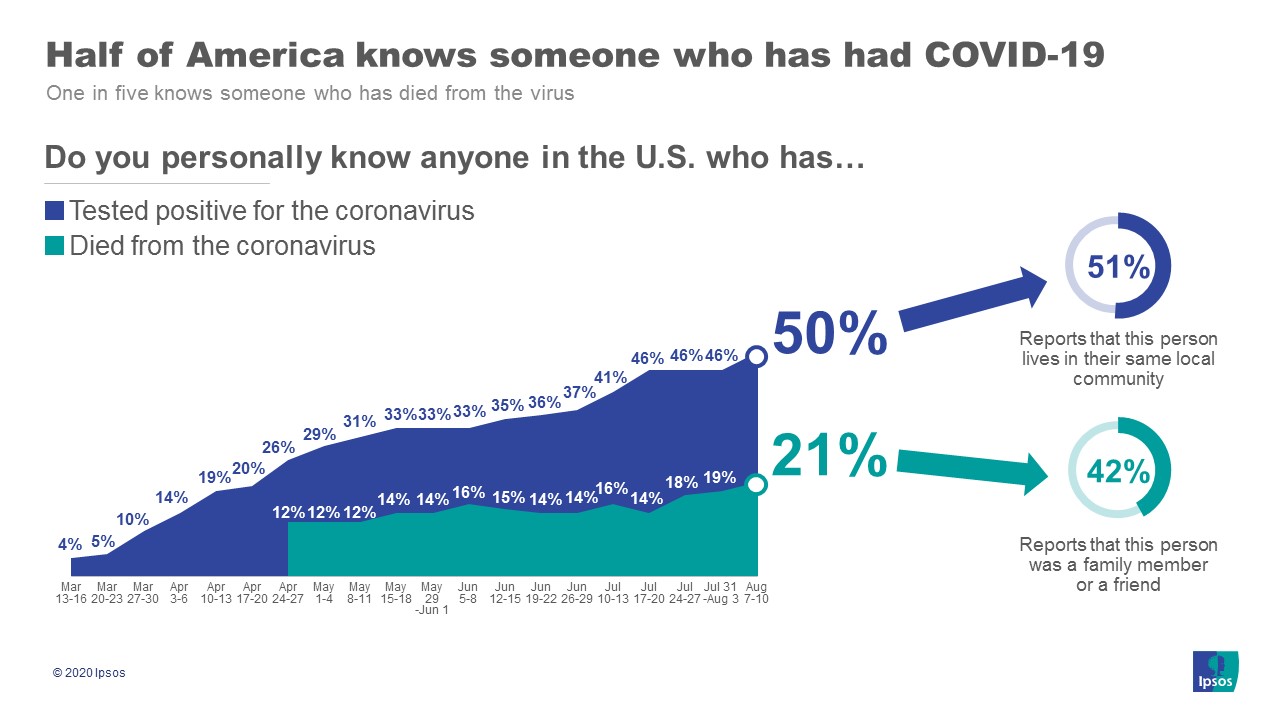
3. Americans remain concerned about the pandemic and see a return to normalcy as a risk. Consequently, many Americans continue to work remotely and commercial activity remains below pre-pandemic levels.
- Most Americans (83%) remain concerned about the pandemic with more than two-thirds (69%) considering returning to pre-coronavirus life as a risk.
- Commercial activity such as going out to eat (36%) remains low and over a third of workers (39%) continue to work from home or remote.
Washington, DC, August 4, 2020
The new Axios-Ipsos Coronavirus Index illustrates that with no confidence in federal response, Americans continue to muddle through the coronavirus pandemic. Two-thirds report wearing masks ‘at all times’ when leaving the home even as the number of people ‘self-quarantining’ falls to the lowest level since the start of the pandemic. This comes as almost half of Americans know someone who has tested positive and almost one in five know someone who has died because of the coronavirus.
Detailed Findings
1. Two-thirds of Americans report wearing a mask ‘at all times’ when leaving the home, even as other social distancing measures fall by the wayside.
- With 67% of Americans reporting wearing a mask at all times, including almost half (48%) of Republicans, mask wearing appears to have become the go-to COVID prevention tool.
- However, among the half (46%) of Americans who visited with friends or family in the last week, only 21% report wearing a mask at all times during their visits, potentially limiting the effectiveness of wearing a mask.
- This comes as the number of Americans reporting that they are ‘self-quarantining’ has dropped to 17% with twice as many, 35%, reporting that they’ve gone out to eat in the last week.
2. Americans remain highly concerned about the coronavirus pandemic and continue to see risks around many ‘normal’ activities. However, at this point voting is not seen as among the more risky activities.
- Almost all Americans (84%) remain concerned about the COVID outbreak, with more than half (59%) extremely or very concerned. Concern has remained at this high level since late June.
- Among the riskier activities are things involving larger gatherings such as visiting friends and family (68%), dining in at a restaurant (70%), or among parents, sending their child to school (66%).
- Only 52% see voting in person as risky. However, there is a vast partisan difference on the question with only 29% of Republicans who view voting in person as risky compared to 64% of Democrats. It is unknown what impact this may have on the November election.
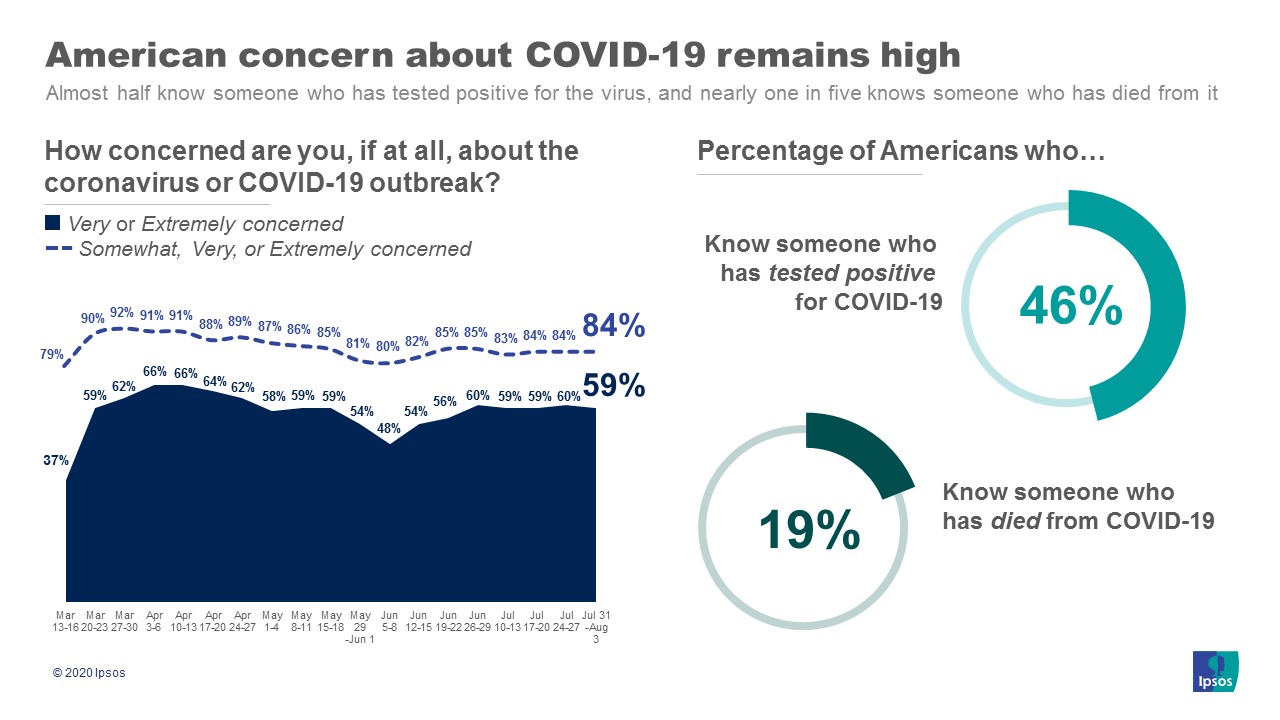
3. Confidence in the federal government has reached a new low as coronavirus comes increasingly close to many Americans.
- Only 29% of Americans have a fair amount or great deal of trust in the federal government to look out for the best interests of them and their families.
- Almost half of Americans (46%) know someone who has tested positive for coronavirus, with half of them (49%) knowing someone in their community who has tested positive. Additionally, 17% of Americans report they personally have been tested.
- Almost one in five Americans (19%) know someone who has died due to the coronavirus. Of these, a quarter (24%; 4% of all Americans) report that the person who died was a family member. Eight percent of Black and Hispanic respondents report knowing a family member who died.
Washington, DC, July 28, 2020
Our latest Axios-Ipsos Coronavirus Index finds Americans struggling to adapt to the ongoing pandemic. Americans are increasingly adopting emergent behaviors like ‘co-bubbling’ (47%) or mask-wearing (63% at all times) to deal with the ongoing concern about getting sick (78% concerned) and the widespread perception of risk (71%) around returning to normal routines.
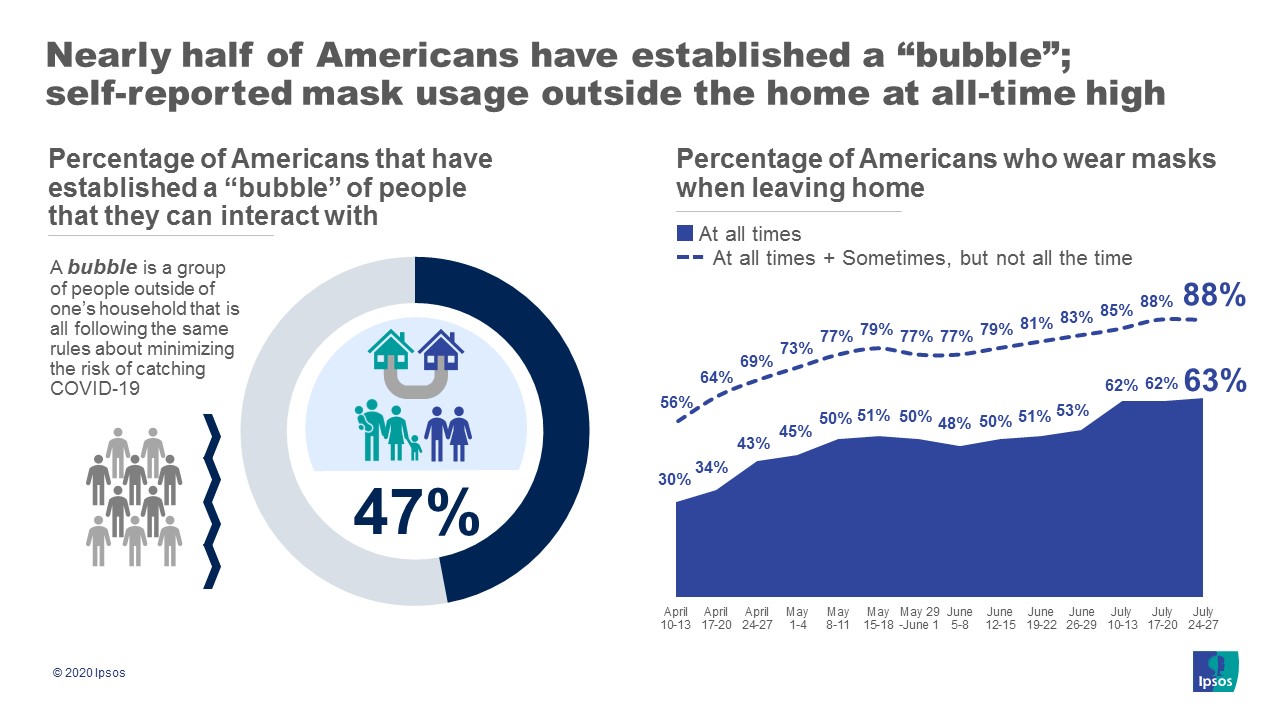
Detailed Findings
1. Americans continue to see others as driving the pandemic, even as virtually all say their own behavior is fine.
- Three-quarters (75%) of Americans say others’ behavior is making the pandemic worse.
- However, almost all (94%) say their own behavior is making the pandemic better.
- Among the roughly half of Americans who saw friends and family in the last week (44%), only one in five report wearing a mask at all times (20%) or maintaining 6 feet of distance (20%).
2. The American public does not see a coronavirus vaccine as an immediate panacea with a clear majority viewing the (potential) first-generation vaccines as being risky.
- Three in five (61%) Americans view “taking the first generation COVID-19 vaccine as soon as it’s available” as a moderate or large risk. This suggests that the public remains wary of the vaccine until its safety has been shown.
- To that effect, over two-thirds (69%) view participating in COVID-19 vaccine trials as risky.
3. Trust in the federal government to look out for the best interests of Americans is at a low in our tracking. Trust in state and local governments also remains lower while employers and health officials retain the public’s confidence.
- Fewer than one in three (30%) Americans trust the federal government this week, down from 32% last week and 53% in March at the start of our tracking.
- Just over half (54%) of Americans trust the state government and a similar amount (58%) trust local governments. This is down from 71% (for both) in March.
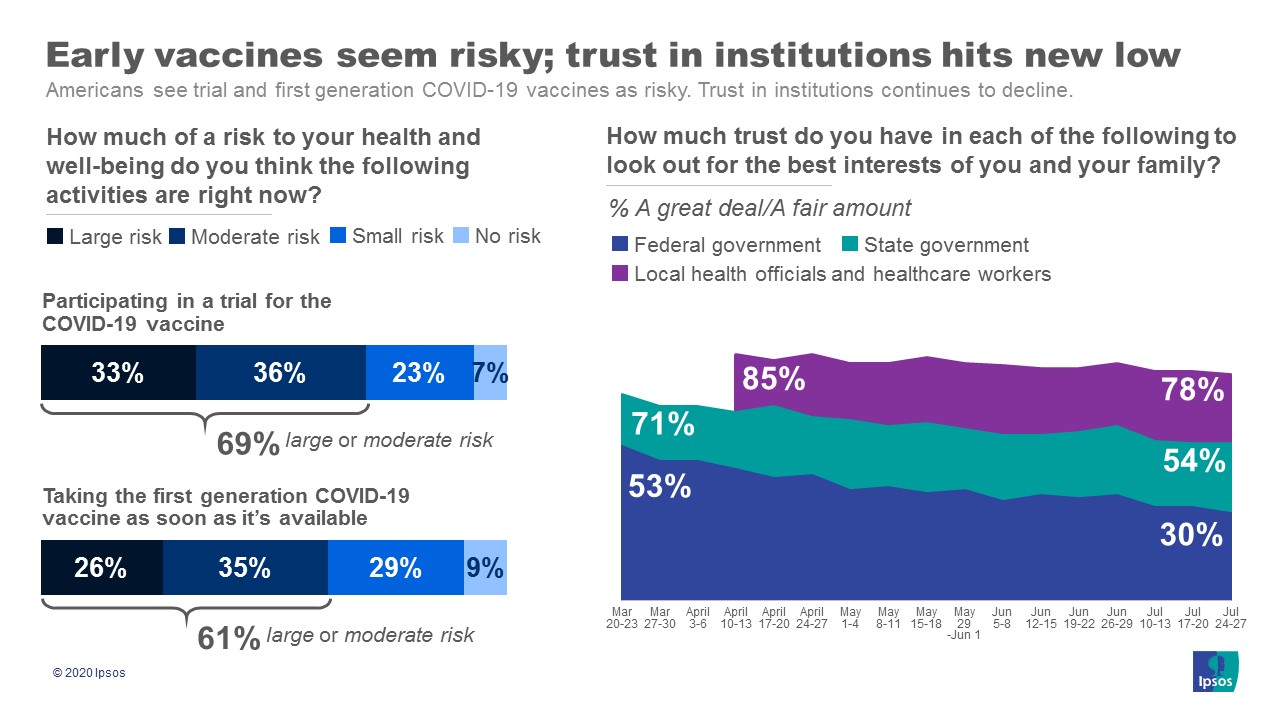
4. Almost half of Americans know someone who has tested positive for the coronavirus. Almost one in five know someone who has died.
- This week, 46% of Americans know someone who has tested positive for the coronavirus – half of whom (23% of all Americans) know someone in their community who has tested positive.
- Almost one in five (18%) Americans know someone who has died from the coronavirus. Black (31%) and Hispanic (28%) Americans continue to be more likely to know someone who has died of coronavirus compared to white (13%) Americans.
Washington, DC, July 21, 2020
As cases continue to climb across the South and West, three quarters of Americans (74%) believe most other Americans are making the COVID-19 pandemic worse. There may be some truth to this concern as new data suggests social distancing measures have stalled-out and few Americans who interact with friends and family outside the home engage in robust protective measures. This comes as more Americans, particularly Republicans, deny the official toll of the pandemic.
Detailed Findings
1. Three-quarters of Americans, from virtually all walks of life, see their fellow country-people as not helping with the pandemic.
- Even a majority of Republicans, 65%, believe that others are making the pandemic worse.
- This includes 35% who believe other Americans are behaving in ways that are making the recovery from the COVID-19 pandemic much worse.
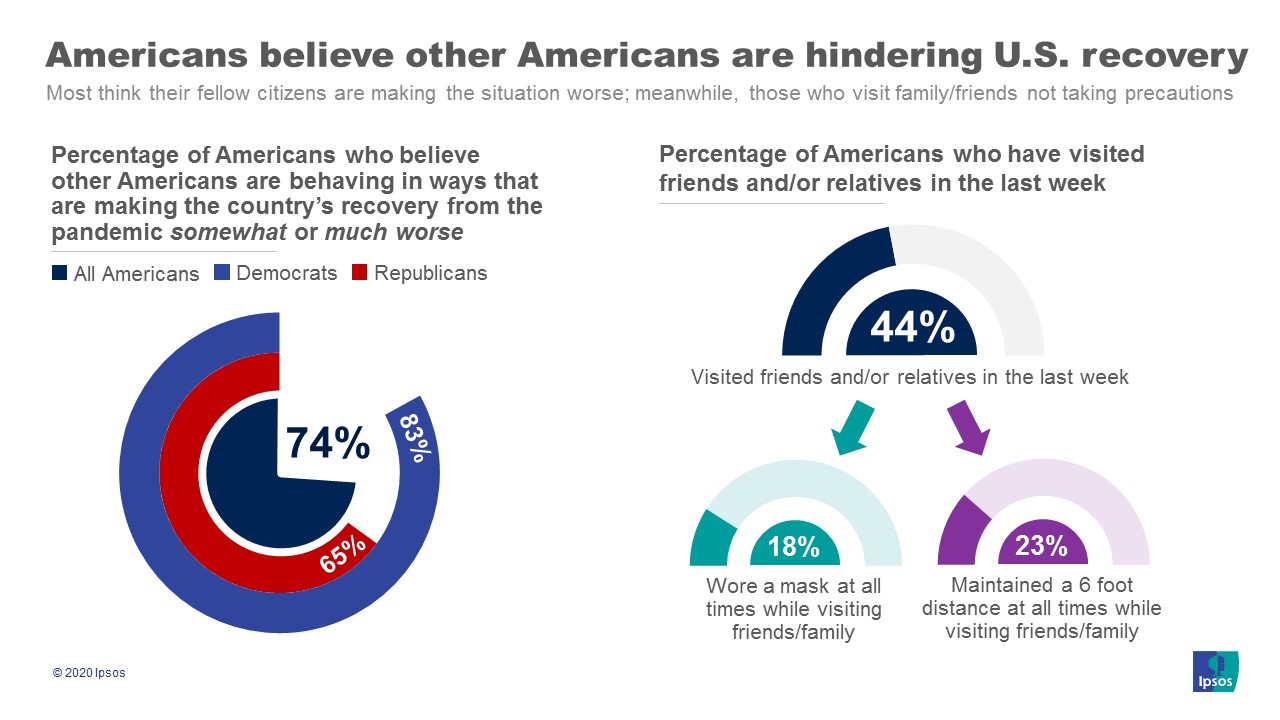
2. Among Americans who report socializing with friends and family in the last week, very few report constant use of protective gear.
- Just under half of Americans (44%) report seeing friends and family in the last week, essentially unchanged since the first of June.
- Among that portion of Americans, very few are observing social distance protocols including fewer than one in five (18%) who report wearing a mask at all times and only a quarter (23%) who report maintaining a distance of 6ft or greater at all times.
- This is despite almost two-thirds (62%) of Americans reporting that they wear a mask at all times when leaving the home.
3. Government at all levels continues to lose the public’s trust regarding coronavirus information.
- While the CDC (70%) and national public health officials (65%) continue to be trusted information sources for most Americans, trust in the CDC has dropped 15 points from early April.
- State governments, while still trusted by a small majority of the public (57%), have also lost about 15 percent of the public’s trust since April.
- Least trusted by the public are the federal government (35%) and the White House (31%).
4. More Americans, particularly Republicans, deny the death toll of the pandemic.
- Almost a third (31%) of Americans believe the real death toll of the pandemic is less than the 135,000 officially reported as of mid-July. A similarly worded question in early May found that a quarter (23%) said the official count inflated the actual toll.
- Republicans (59% from 40%) and people who get most of their political information from Fox News (61% from 44%) are the most likely to say that the real number of deaths is less than the official count.
- Democrats (61% from 63%) continue to mostly believe the real toll of the pandemic is greater than what has been officially reported.
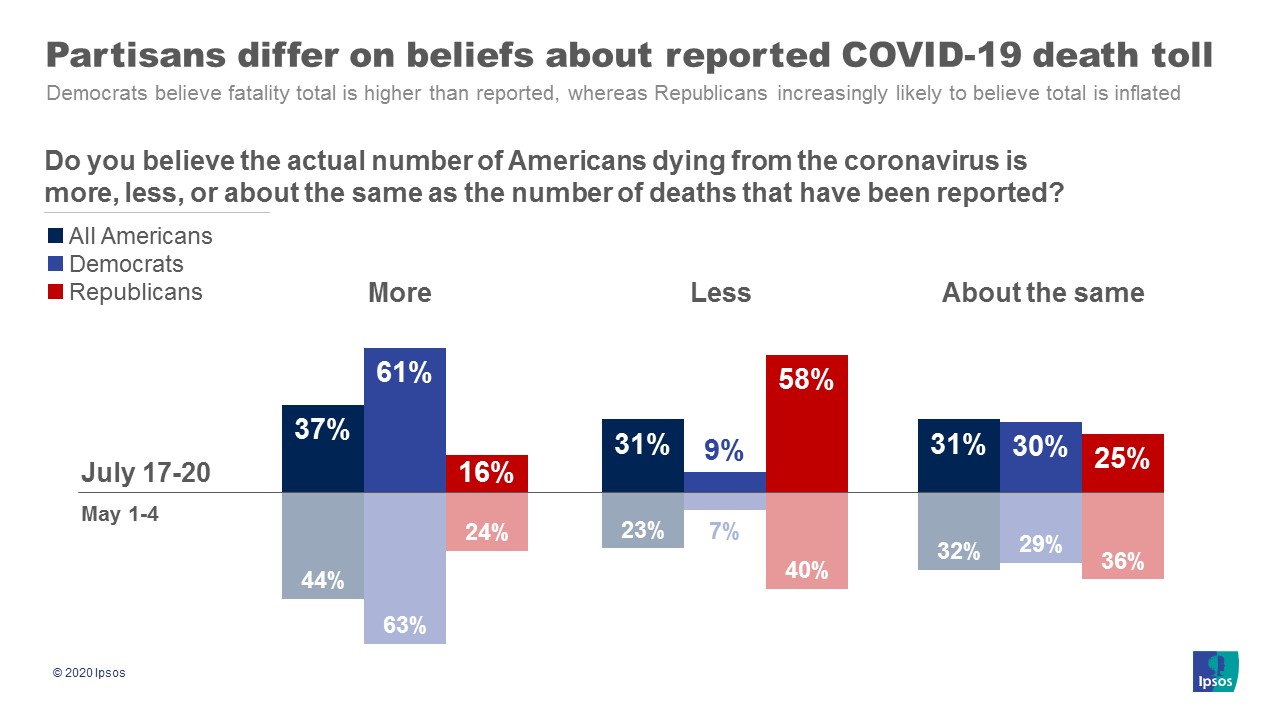
Washington, DC, July 14, 2020
Fewer Americans report self-quarantining now than any point since the start of the pandemic according to our latest Axios-Ipsos Coronavirus Index. This corresponds with socializing and commercial activity remaining high, if not quite to pre-pandemic levels. However, more Americans see returning to a pre-coronavirus life as a large risk now than at any time since the high-point of the initial wave in mid-April.
Detailed Findings
1. Despite the surge in cases across the South and West, Americans continue to venture out of the home at higher rates and do not re-embrace major social distancing.
- Fewer than one in five (19%) of Americans report self-quarantining the last week, the lowest level since tracking began at the eve of the outbreak in early March.
- Just under half of Americans (47%) report visiting friends and relatives in the last week, a third (30%) report going out to eat, and about one in six (16%) visited elderly relatives in the last week – all essentially unchanged from levels in mid-June before the current spike in cases.
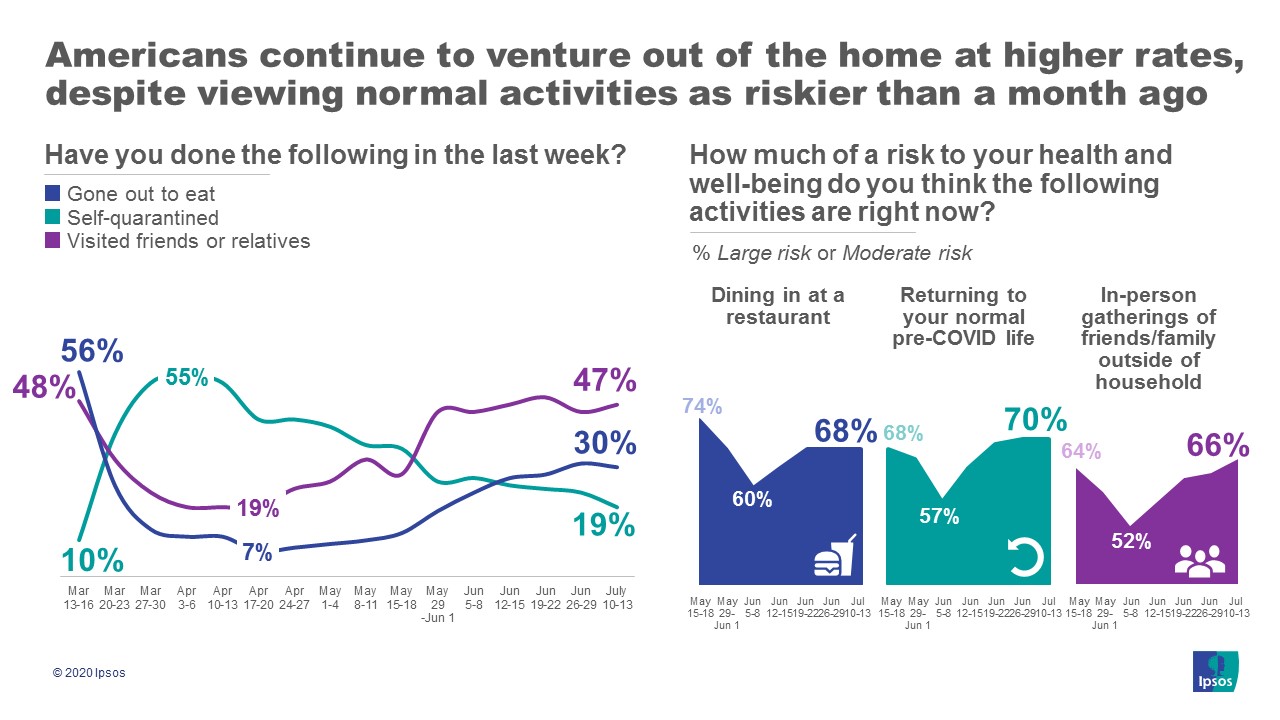
2. However, as cases surge, Americans are increasingly seeing normal activities as posing large risks.
- A third of Americans (33%) see attending in-person gatherings of friends as a large risk to their health. Additionally, over a third (37%) say dining out, just under a third (30%) say going to a salon, and over a quarter (27%) of Americans working remote or temporarily not working say returning to their normal place of employment is a large risk. All are the highest levels since mid to late May.
- As debate about back-to-school rages, a large majority of parents (71%) say sending their child to school in the fall is a large or moderate risk.
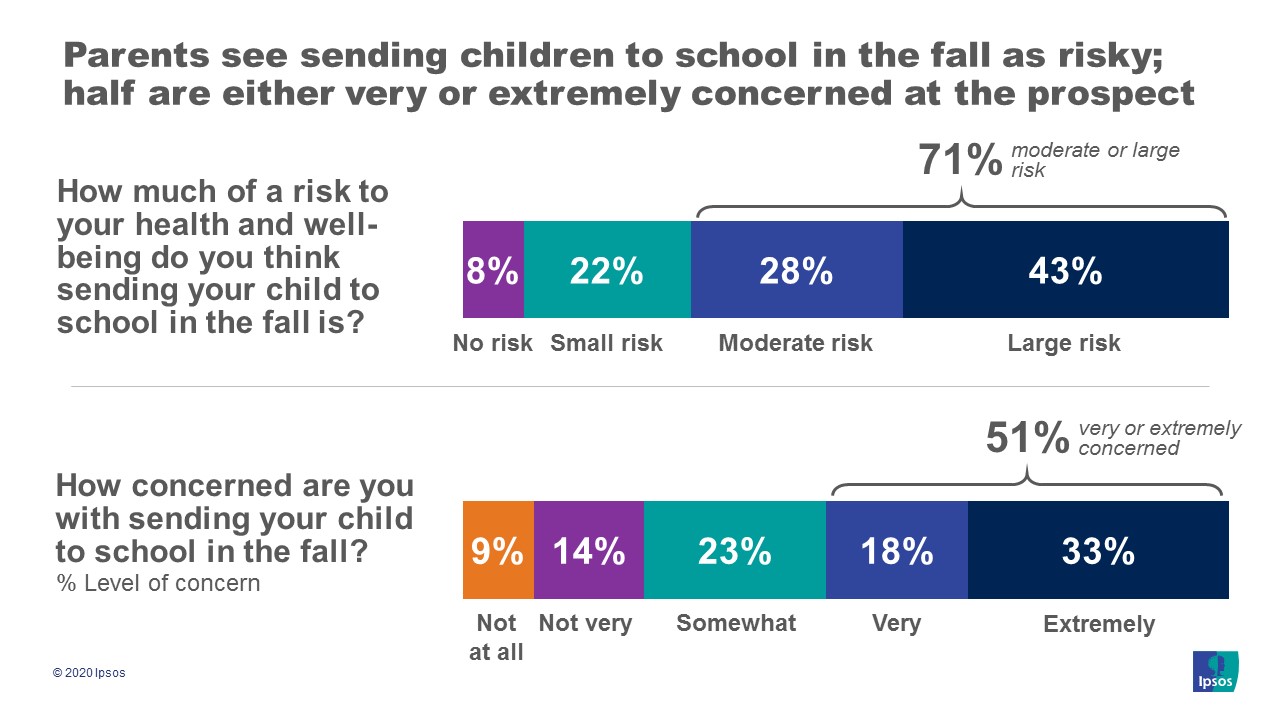
3. Most Americans appear to be embracing mask use as a tool to cope with the coronavirus pandemic.
- As of July, three in five Americans (62%) report wearing a mask at all times when leaving the home with an additional 23% reporting sometimes wearing a mask (85% total). This is the highest level of mask use since tracking began in April.
- Among the approximately two in five (38%) Americans who do not wear a mask at all times when out of the home…
- A third (32%) report not being allowed into an establishment without a mask (about 12% of the total population).
- One in five (21%) report being told to wear a mask by another person (about 8% of the total population), up from 15% at the end of May.
4. As the pandemic continues, public trust in both the federal government and state governments has fallen to a low in this tracking.
- A third of Americans (32%) have a fair amount or great deal of trust in the federal government to look out after the best interests of their family. This is down from 53% in mid-March.
- Just over half (55%) trust their state governments, down from 71% in mid-March. Trust in the state government is lowest in the states currently hit the hardest (47% average cross AZ, FL, GA, and TX).
Washington, DC, June 30, 2020
As June ends, the latest wave of the Axios-Ipsos Coronavirus Index finds that American fears of the coronavirus pandemic have resurged to levels last seen during the acute parts of the initial wave. This comes, however, as Americans continue to leave the home more frequently, albeit while taking protective measures.
Detailed Findings
1. Levels of concerns have returned to levels last seen in early May as the pandemic spreads across the South and West.
- Almost two-thirds (60%) of Americans are very concerned about the coronavirus outbreak, with an additional quarter (24%) somewhat concerned.
- Over three quarters (78%) are at least somewhat concerned about the possibility of getting sick, up 9 points from the beginning of June.
- Three quarters (76%) are concerned about their community re-opening too soon, the highest level in our tracking.
2. Correspondingly, perceptions of risk also continue to increase, particularly views of activities that may bring the respondent into contact with large groups of people.
- Over two-thirds (70%) currently say that returning to their pre-COVID life is a moderate or large risk.
3. Risk aversion may also put a damper on the upcoming Fourth of July holiday with 78% saying attending celebrations is a large or moderate risk.
4. Americans have started curtailing social engagement, however the number engaging in out of home commercial activities remains stable or continues to increase.
- Less than half (45%) of Americans say they visited friends and family in the last week, down from the post-COVID high of 49% last week. Additionally, visiting elderly relatives is flat at 14%.
- However, going out to eat continues to increase, now with 31% of Americans reporting having done so in the last week. Visiting a salon or retail store is flat from last week.
Washington, DC, June 23, 2020
Our latest Axios-Ipsos Coronavirus Index finds that Americans are increasingly concerned about coronavirus and seeing ‘regular’ activities as increasingly risky after sentiment moderated earlier in June. This uptick in fears comes as Americans address a possible second wave and reflect on their potential to re-enter social distance quarantines if major warning thresholds are met.
Detailed Findings
1. American concern with the coronavirus outbreak, while not as widespread as during early April, has increased notably over the past two weeks.
- Currently, 85% of Americans are at least somewhat concerned with the outbreak, including 56% who are extremely or very concerned. This is up from 80% and 48% respectively in early June.
- Concern with communities re-opening too soon (to 71% from 64%) and the possibility of getting sick (to 76% from 69%) are also up 7 percentage points over the last two weeks.
- Eighty-five percent of Americans are concerned about a second wave of the coronavirus, including 59% who are extremely or very concerned.
2. “Normal” activities are seen as increasingly risky by many including doing their job, going to the grocery store, or socializing with friends after multiple weeks of minimizing concerns.
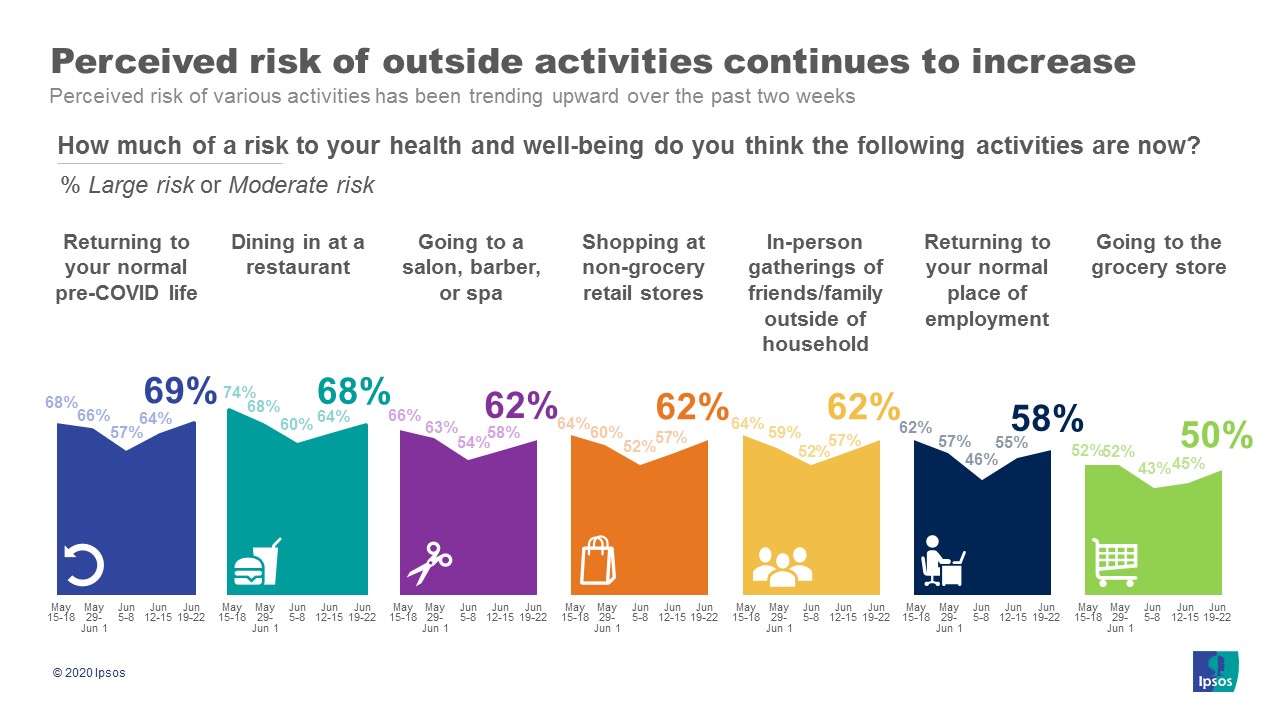
3. Americans continue to report that if a second wave hits their state, they will substantially withdraw to protect their health. They also express that they are watching for a wide range of signals of a second wave indicating it may not be official announcements that trigger a rebound in behavior.
- About four in five Americans say they are likely to stay home and avoid others as much as possible if…
- The CDC issued guidelines for people in their state to stay home.
- Their state’s governor issued guidelines for people to stay home.
- There is a new spike in cases in their state.
- Nearby hospital ICUs report full or near-full capacity.
- Someone they know tests positive for the virus.
- Someone they know is dying from the virus.
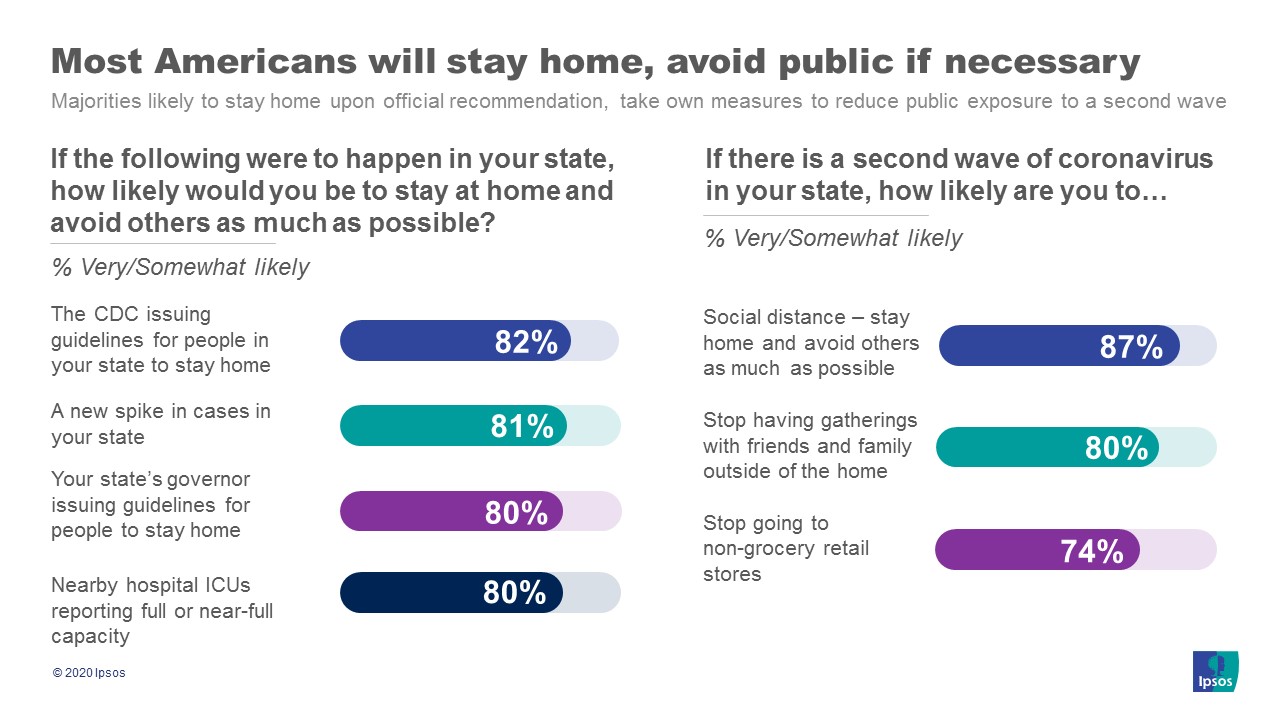
4. Social distancing behaviors continue to subside, but geographical differences remain in people’s experiences.
- Half of Americans (49%) visited friends or relatives in the last week, up from 47% last week and 19% in early April. However, in the states with the greatest increase in cases (AZ, FL, SC) socializing with friends has declined from 52% to 44% in the last two weeks.
- The number of Americans working remotely has also begun to decline, this week at 37% of all employed persons from 43% last week.
5. One percent of the U.S. population has tested positive for coronavirus at this point.
- About one in ten Americans have been tested (11%) and about one in ten (9%) of those tested, tested positive, equal to about 1% of the overall population.
Washington, DC, June 16, 2020
At the end of our third month of tracking America’s response to the coronavirus pandemic, the Axios-Ipsos Coronavirus Index finds that even while Americans are increasingly engaging with each other outside the home, concerns about a second wave and perceived risks of regular activities mount.
Detailed Findings
1. More Americans are very concerned about the overall COVID-19 outbreak than last week as a majority express high levels of concern about a second wave of the coronavirus.
- Fifty-four percent of Americans are extremely or very concerned about the outbreak, up from 48% last week, while 56% report being extremely or very concerned about a second wave.
- Sixty-four percent view returning to their pre-COVID life as risky right now, up from 57% last week.
2. If there is a second wave, large majorities of Americans report that they are likely to pull back into more socially distancing behaviors.
- Two-thirds (65%) say they are somewhat or very likely to self-quarantine in the event of a second wave in their state and almost all (85%) report they will take steps to social distance.
- This extends to social interactions – 79% report they are likely to stop gathering with friends or family – and commercial behavior – 73% report they would stop going to non-grocery retail stores.
3. As discussion of a second wave mounts, Americans report seeing many ‘normal’ activities as being more risky than just a week ago.
- The number of Americans who report viewing gatherings of friends and family as risky has climbed 5 percentage points from last week (57% moderate or large risk from 52%).
- Additionally, views of dining in at a restaurant (64% risky from 60%), shopping at a retail store (57% risky from 52%), or going to a barber or salon (58% risky from 54%) have all increased this week.
- Large gatherings remain highly suspect with 89% viewing attending protests and 74% viewing attending Fourth of July celebrations as a risk to their health or well-being.
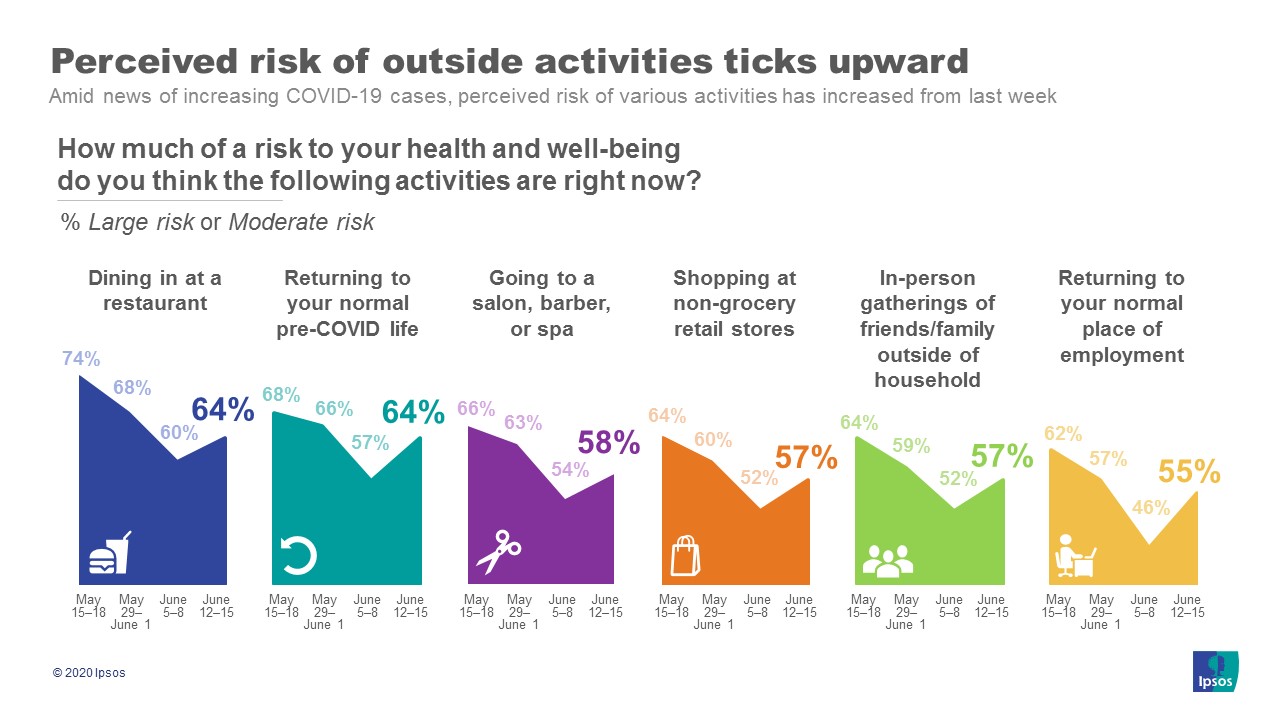
4. Over a third of Americans know someone who has tested positive for coronavirus.
- While 35% know someone who has tested positive, it remains more prevalent in the Northeast (53%) than other parts of the country.
- Nine percent of Americans report they have been tested for coronavirus in our latest survey. Of those, 6% say they tested positive. This represents about 0.6% of the U.S. population.
Washington, DC, June 9, 2020
The newest Axios-Ipsos Coronavirus index finds that the types of Americans who are closest to the ongoing protests are the same people most concerned about coronavirus and a potential surge. Additionally, Americans are increasingly getting comfortable with the risk of infection in ‘normal’ activities.
Detailed Findings
1. One in ten Americans (11%) report someone in their immediate family or close circle of friends attended an in-person protest or demonstration in the last week.
- Fewer (2%) report attending a protest themselves. A number that would represent about 5 million Americans.
- Younger people (ages 18-29, 20%), Democrats (16%), and residents of urban areas (14%) are more likely to say they know someone who attended a protest.
2. Many of the groups attending the protest see the protests as being risky and are concerned about a potential coronavirus surge.
- Almost all Americans (86%) see going to protests or demonstrations to be a large or moderate risk to their health.
- Half of Americans (50%) are extremely or very concerned about a spike in coronavirus cases as a result of these protests, including 60% of Democrats.
3. In general, Americans are seeing ‘normal’ activities as less potentially risky than a few weeks ago.
- Fewer than half of Americans (43%) say going to the grocery store is a large or moderate risk, down from 52% last week.
- Also declining in perceived risks are: gatherings of friends (now at 52% from 59% last week), dining at a restaurant (now at 60% from 68%), or shopping at retail stores (now at 52% from 60%).
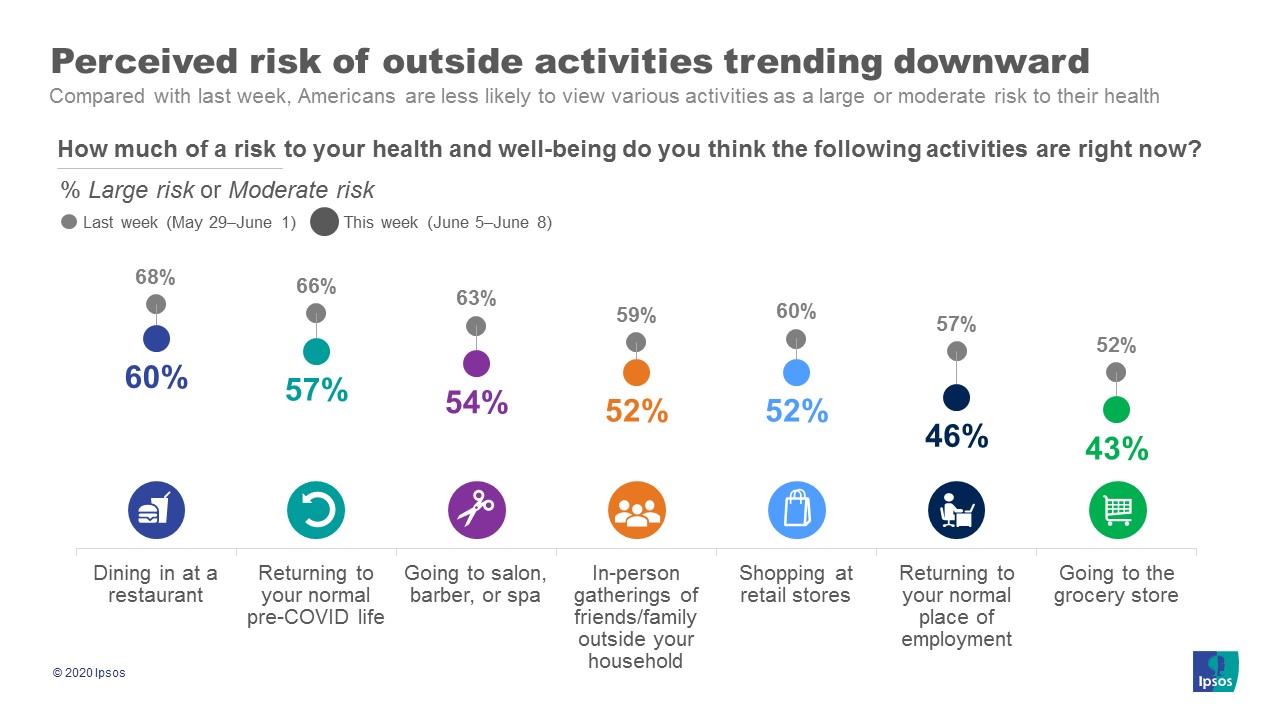
4. A third of Americans (33%) now know someone who has tested positive for coronavirus and 1 in 6 (16%) know someone who has died.
- Additionally, about one in ten (9%) say they have been tested with 5% of those saying the test was positive (equal to about ½ of a percent of the population).
Washington, DC, June 2, 2020
The latest Axios-Ipsos Coronavirus Index shows that as America uncoils from the coronavirus lockdowns, experiences and fears vary widely by race and partisanship, potentially fueling the dramatic protests observed over the last week. With localities reopening, Americans are starting to reengage with each other, however concerns remain high and fewer report restarting commercial activities.
Detailed Findings
1. African Americans report different, and generally worse, impacts of the coronavirus pandemic.
- Over a quarter (28%) of African Americans know someone who has died due to coronavirus compared to only 11% of White Americans.
- Despite only a small difference between the number of African Americans (41%) who know someone that has tested positive for coronavirus compared to white respondents (31%).
- More than half (61%) of employed African Americans are at least somewhat concerned about their job security, compared to 39% among White Americans.
- A third (33%) of African Americans report their personal finances are in poor shape right now, almost twice the level seen among whites (18%).
2. African Americans have less trust in both the national and local government responses, and express major concerns with biases in the effects of the pandemic.
- Fewer than one in five (18%) African Americans trust the federal government to look out after the best interests of their families. Local (46%) and state (52%) governments do slightly better.
- African Americans express extremely low levels of trust in local police forces (36%) compared to White Americans (77%).
- Most African Americans (75%) are extremely or very concerned about the pandemic doing greater damage to people of color compared to 42% of Hispanic Americans and 30% of White Americans who say the same.
- Likewise, 70% of African Americans are extremely or very concerned with the official pandemic response being biased against certain groups, compared to 32% of White Americans.
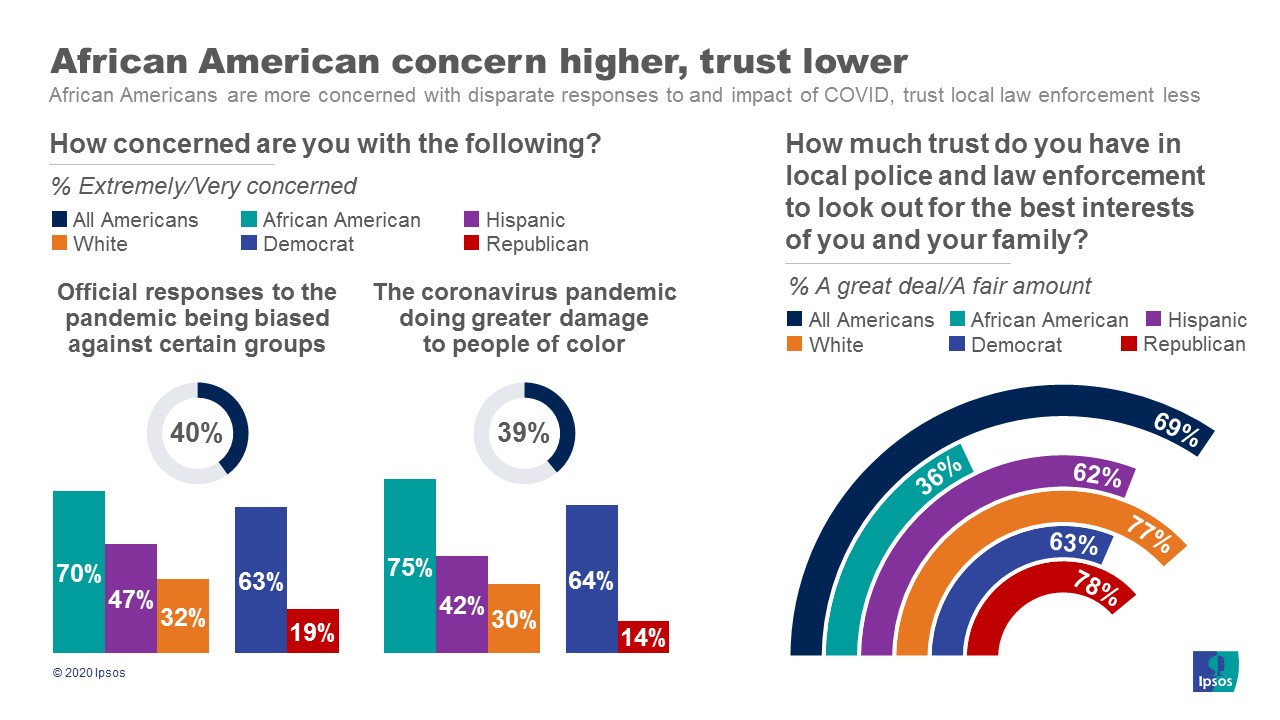
3. This comes as total social distancing draws to a close, although people remain slow to reengage in commercial activities.
- Forty-five percent of Americans visited friends or relatives in the last week, up from 38% two weeks ago and basically in line with the 48% in early March as our tracking and the pandemic began.
- Only a quarter (26%) report self-quarantining (down from 35%) and 80% report social distancing (down from 87%).
- However, less than one in five (18%) report going out to eat, 12% report going to a salon or barber, and 37% report going to a non-grocery retail establishment.
4. Most Americans continue to wear masks out of home, with only a few reporting altercations based on mask use.
- Fifty percent of Americans report wearing a mask ‘at all times’ when leaving the home with an additional 27% reporting wearing one some, but not all the time. Only 10% report never wearing a mask.
- Of people who wear a mask, 12% report that they’ve told someone else to put a mask on, and only 3% report that someone else has told them to remove the mask.
- Among people who, at least occasionally, do not wear a mask, 15% report that they’ve been told by someone else to put one on, and over a quarter (28%) say they’ve not been allowed into an establishment without a mask.
Washington, DC, May 19, 2020
1. Americans are open to locally-run, in-person contact tracing systems.
- A large majority of Americans say they would likely follow several key aspects of contact tracing systems including 84% who say they would be likely to self-quarantine if they were notified that they came into contact with a coronavirus-infected individual and two-thirds (76%) would give officials a list of all the people they had recently come into contact with.
- However, fewer (56%) would give access to their cell phone location data echoing the 51% who would opt-into a cell-phone based tracing system established by public health officials in our wave 9 study.
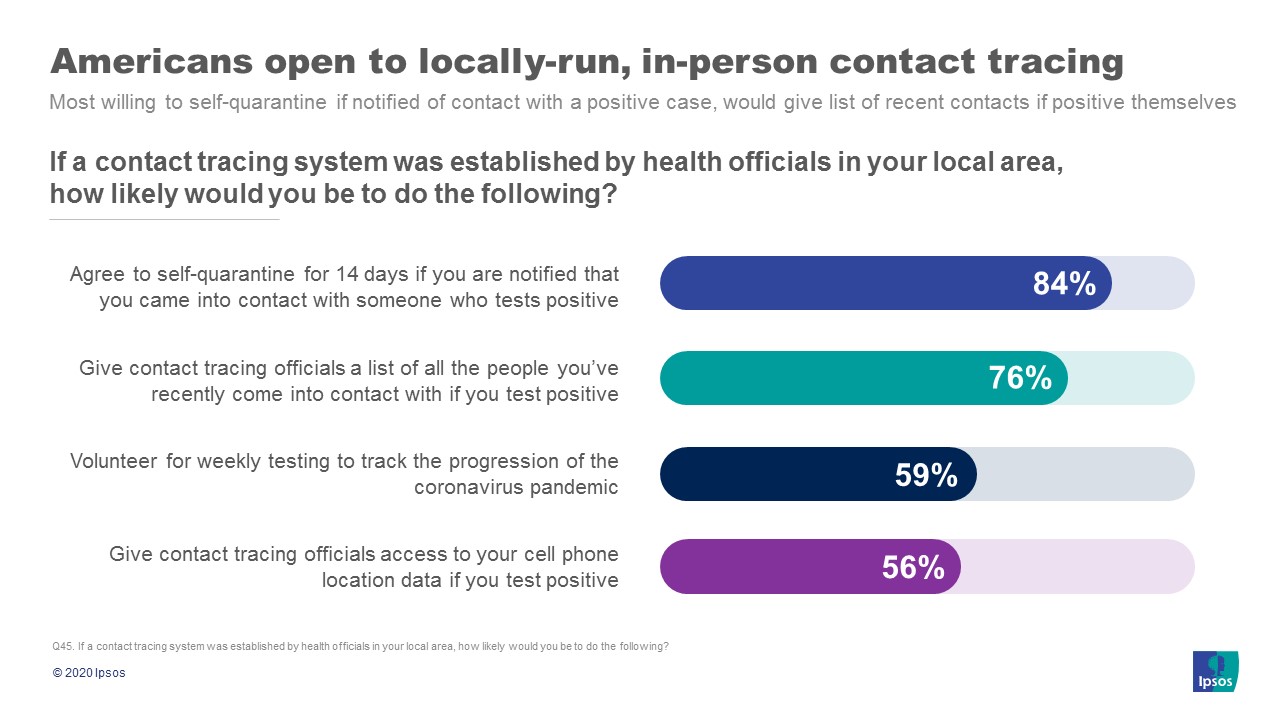
2. The end of social distancing is driven by seeing friends and family.
- Over a third (38%) of Americans report visiting friends or relatives in the last week, up 6 percentage points from last week, and almost twenty from the high point of social distancing in mid-April. Likewise, nearly a third (31%) of parents report their kids playing with other kids in the last week.
- While also climbing, many fewer Americans report going out to eat (12%) or going to a salon (7%) in the last week.
- Sixty-four percent of Americans currently view seeing family or friends as a large or moderate risk to their health, down from 81% in mid-April. Currently, 74% view dining in at a restaurant and 66% view going to a salon as a large or moderate risk.
3. Memorial Day is going to be a questionable start to the Summer holiday season.
- Half of Americans (49%) say they have canceled summer vacation plans.
- Seventy-five percent view taking a vacation as a large or moderate risk to their health while 84% view attending a sporting event as a large or moderate risk.
4. Trust in the federal government continues to decline as state governments hold steady.
- Slightly more than a third (37%) of Americans currently say they trust the federal government to look out after the best interests of their family, down from 43% in late April.
- Almost two-thirds (61%) currently trust their state governments, a figure that has held steady since late April.
- Employers (78%) and local health officials and healthcare workers (84%) remain the most trusted.
Washington, DC, May 12, 2020
The ninth week of the Axios-Ipsos Coronavirus Index finds social distancing continues to decline as fewer people see visiting friends and family as a major risk. However, about one in eight report knowing someone in their community who tested positive and over three-quarters report wearing a mask when leaving the home.
Detailed Findings
1. Social distancing continues to decline as states begin to reopen and people tire of the quarantines.
- 32% of Americans report visiting friends or relatives in the last week, up from 26% last week and 19% in mid-April.
- Additionally, the number who report ‘self-quarantining’ is down to 36% from a high of 55% in early April.
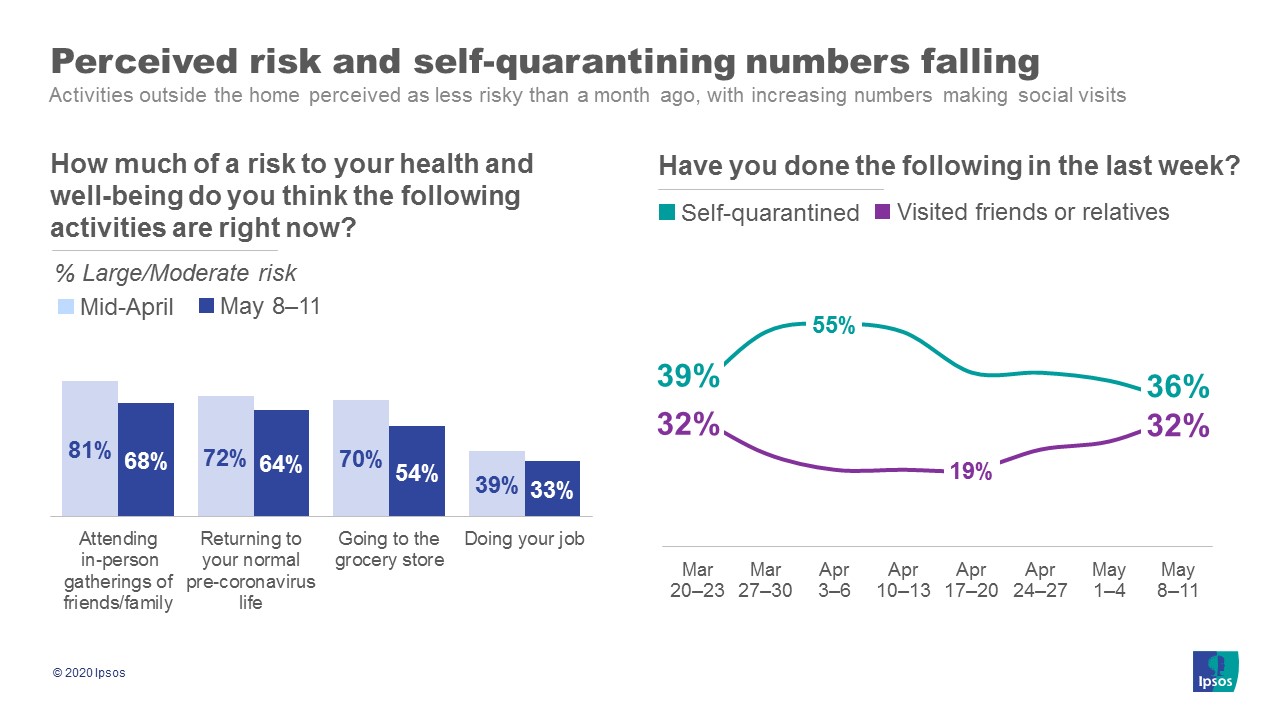
2. While still a significant concern, fewer Americans are seeing coronavirus as a major risk.
- Two-thirds (64%) of Americans say returning to their pre-coronavirus lives right now would be a large or moderate risk to their health and well-being, down from 72% in mid-April.
- Fewer Americans are also seeing in-person gatherings (81%->68%), going to the grocery store (70%->54%), or doing their job (39%->33%) as a large or moderate risk compared to mid-April.
3. Most Americans say they are following guidelines when leaving the home, but see others not giving social distancing space.
- Most (60%) of Americans say they are maintaining a distance of at least 6ft from others outside their homes and half (50%) report wearing a mask all of the time.
- However, only about one in five report seeing others wearing masks (18%) or maintaining social distance (17%) all of the time.
4. Few Americans are likely to opt-in to cell phone-based contact tracing systems at this time.
- Only about a third of Americans say they are likely to opt-in to cell phone based contact tracing systems established by the federal government (31%), major tech companies (33%), or cell phone companies (35%).
- A bare majority (51%) would join a CDC sponsored cell phone-based system.
5. Americans still think going back to work — and getting there — is risky.
- A majority (58%) of people who are working from home, have returned to work, had their business shut down, are furloughed, or laid off think going back to work is a moderate or large risk.
- Using ride-sharing or taxis is seen as risky for three quarters (75%) of Americans.
Washington, DC, May 5, 2020
The eighth week of the Axios-Ipsos Coronavirus Index finds Americans reporting increased visits with friends and family as longing for company frays social distancing. Additionally, declining trust in state governments is observed in the early-reopening states of Florida, Georgia, and Texas.
Detailed Findings
1. Over a quarter of Americans report visiting friends and family in the past week, up from mid-April.
2. American working conditions are largely unchanged with significant parts of the population still working from home or out of work.
3. The number of Americans reporting receiving stimulus money increased, however, much of it still seems to not be going back into the economy.
4. Trust in state governments to take care of people is trending down, driven most strongly by residents of states pushing to re-open.
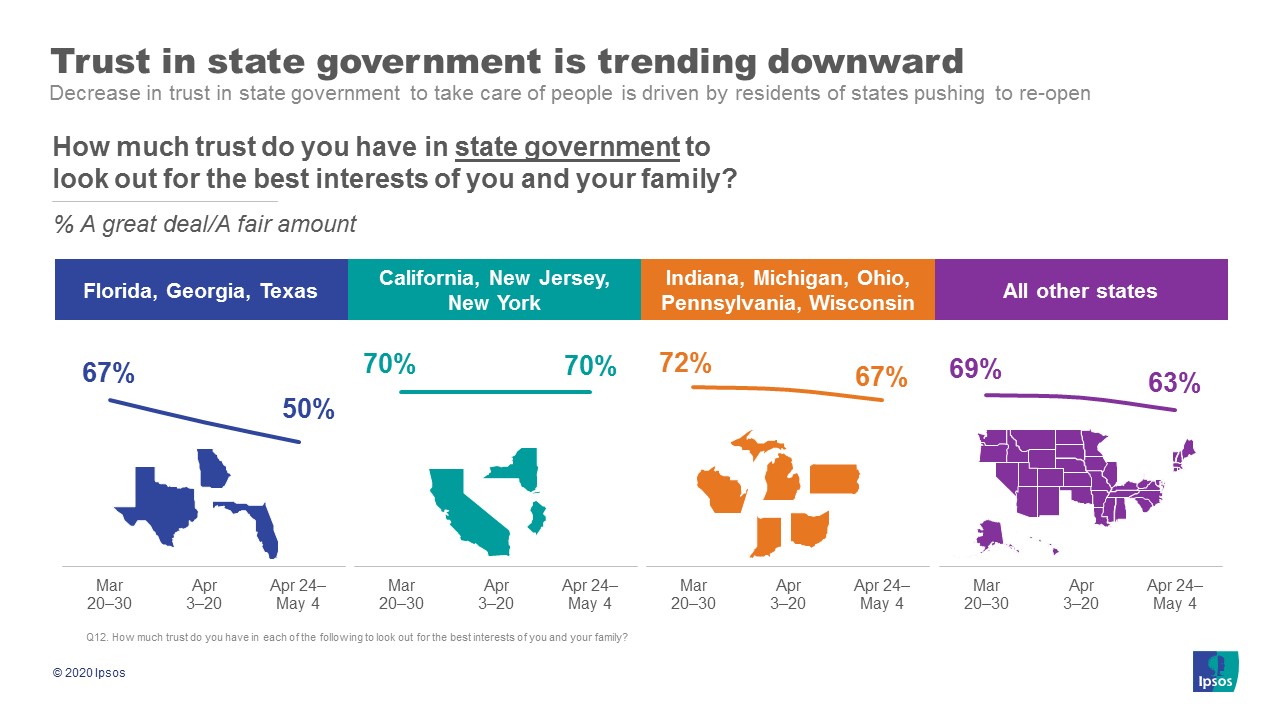
Washington, DC, April 28, 2020
The seventh week of the Axios-Ipsos Coronavirus Index finds America adapting to the quarantine equilibrium, even as partisanship and some slippage of social distancing start to appear. Additionally, over a quarter of Americans now know someone who has tested positive for the coronavirus while about 1 in 8 know someone who has died.
Detailed Findings
1. Americans are acclimating as fewer report negative impacts on their mental health, emotional well-being, stress, and ability to do their jobs. Additionally, fewer people report shortages or inability to find staple items.
- 28% of Americans report worsening mental health, down from 34% in early April. Likewise, 34% report worsening emotional well-being, down from 41%.
- 33% report their ability to do their job has gotten worse, down from 47% in early April.
- 46% report that their ability to access food and household needs has gotten worse, down from 66% in late March.
2. Concern about the pandemic and trust in the federal and state government responses continue to be strongly tied to partisanship.
- Republicans, particularly Republicans who get most of their news from Fox News, are more likely to trust the federal government (66%) and less likely to think that returning to their pre-coronavirus lives tomorrow is a major risk (58%).
- Democrats widely distrust the federal government (28%), trust governors (71%), and believe returning to normal right now is a big risk (84%).
3. Much of the stimulus money does not appear to be going directly back into local economies.
- Only half of Americans (49%) report receiving government stimulus money, unchanged from last week.
- Among those who have, a third (38%) report putting it into savings with an additional 18% reporting not spending it yet.
- A quarter (25%) report using the stimulus money to pay for food and household needs and 14% report using it to pay rent or mortgage.
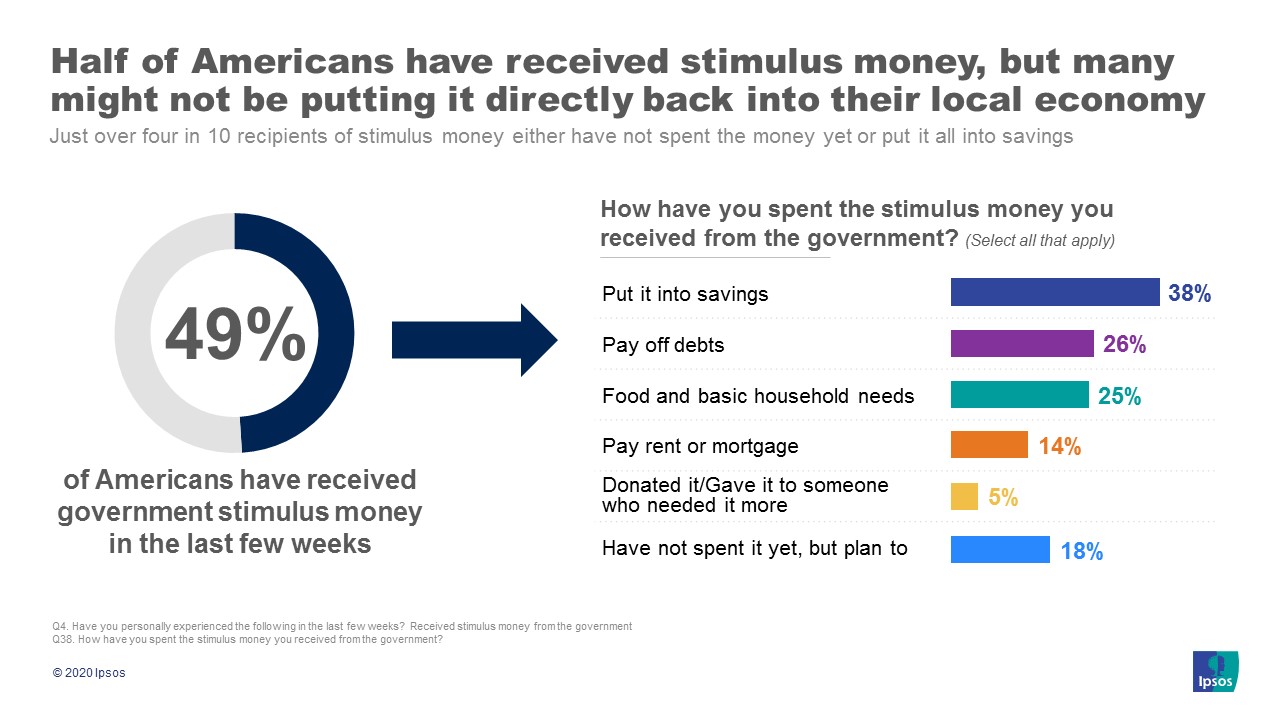
4. The number of Americans reporting visiting friends and relatives is up for the first time since the pandemic began, suggesting some fraying to social distancing.
- This week 24% of Americans report visiting friends and family in the last week, up from 19% last week. This increase is seen across most demographic groups.
Washington, DC, April 21, 2020
The sixth week of the Axios-Ipsos Coronavirus Index finds that Republicans are increasingly likely to minimize the risk of the coronavirus pandemic while Democratic trust of the federal government response continues to erode. Both sides continue to hold state governments and health professionals in high regard.
Detailed Findings
1. Republicans, who had increased in levels of concern about the coronavirus pandemic over the last few weeks, have reversed course as the President and Republican governors have shifted towards a focus on ending social distancing.
- This week, 49% of Republicans are extremely or very concerned about the coronavirus outbreak, down from 56% last week.
- This is while 80% of Democrats remain concerned.
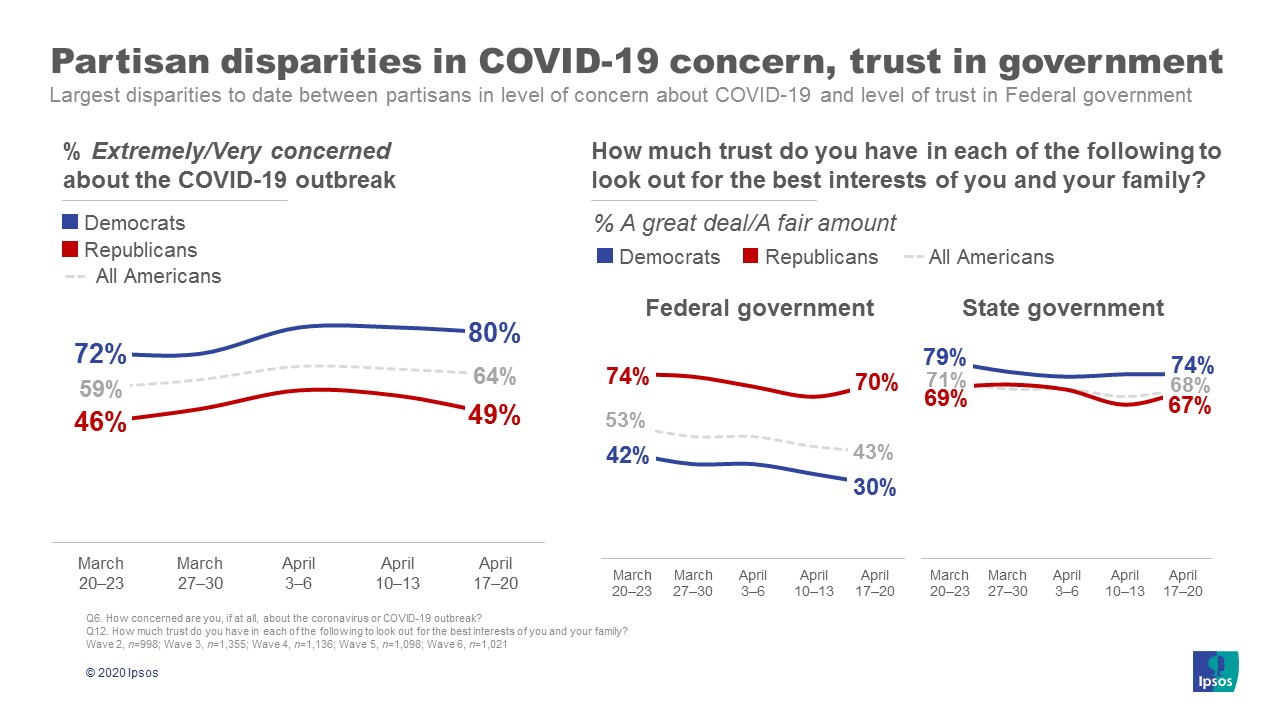
2. Over two-thirds of Americans think going back to their pre-coronavirus lives right now would be a moderate or large risk to their health.
- Partisanship appears to have a stronger connection to perceptions of risk than many other demographic factors.
- Only 21% of Republicans view going back to their normal lives to be a ‘large’ risk compared to 52% of Democrats.
3. Most measures of personal or professional impact of the pandemic are stable from last week.
- Physical and mental health impacts are roughly equal to where they were seen last week with about 1/3 reporting worsened mental or emotional well being and 1/6 reporting worsened physical health.
- 2 in 5 employed Americans continue to work from home while over 1 in 4 have been furloughed, laid off, or had their employers close, again consistent with last week.
4. Almost half of Americans report receiving government stimulus money.
- 49% of Americans report receiving stimulus money from the government in the past few weeks. Americans between the ages of 30 and 64, Midwestern, have some college education, and suburban and rural are more likely to report receiving the government aid.
Washington, DC, April 14, 2020
The fifth week of the Axios-Ipsos Coronavirus Index finds while the country continues to maintain the uneasy quarantine equilibrium, Americans still working out in the world feel more at risk. At the same time, the number of Americans who know someone infected continues to climb.
Detailed Findings
1. Over half of Americans still working outside of the home feel that doing their jobs puts their health and wellness at risk right now compared to a small minority of those working from home.
- This week, 57% of Americans still working out in the world report that they feel doing their job is a moderate or large risk to their health. Of those working from home only 13% say the same.
- However, those working in the world are also less likely to report using a mask (44%) compared to the average of all Americans 56%.
- Additionally, those furloughed, laid off, or whose employers closed are more likely to report increasing household debt over the last month (34%).
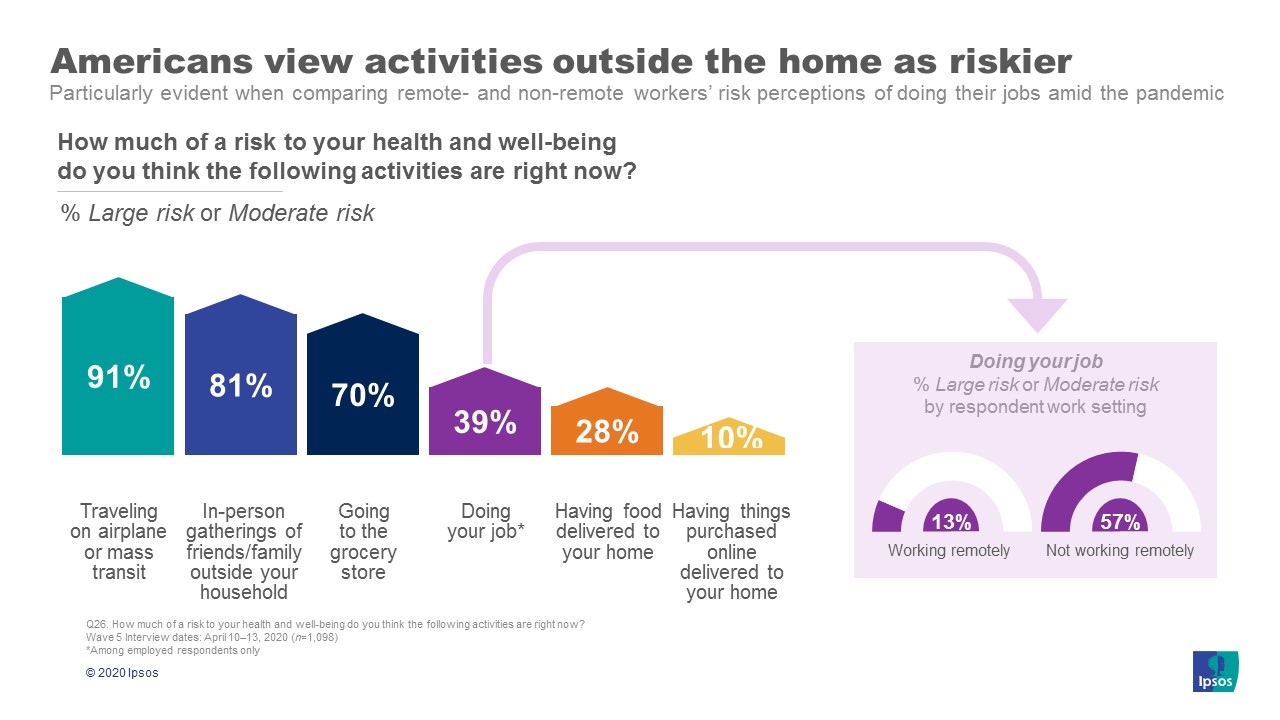
2. About one in five Americans now know someone who has tested positive for the coronavirus. The greatest concentration of people with coronavirus in their personal network remains the Northeast region including New York, but the South has posted the greatest rate of increase over the last week.
- 19% of Americans report knowing someone who has tested positive for coronavirus, up from 14% last week and 10% two weeks ago.
- 31% of people in the Northeast report knowing someone who has tested positive for coronavirus, while 18% of people in the South report knowing someone.
3. In what could be viewed as positive news, the outbreak appears to have increased the amount of quality leisure time for many Americans.
- Two in five Americans (43%) report spending more time talking with their family compared to a month ago. A similar level (41%) report spending more time on home improvement or craft projects.
- Over half (53%) report watching more television in the last month.
- However, one in eight (16%) say the amount or intensity of disagreements with family or friends have increased in the last month. This is particularly acute among those who have been furloughed or laid off (26%).
Washington, DC, April 7, 2020
The fourth week of the Axios-Ipsos Coronavirus Index finds a country taking its breath after profound changes to the shape of society. Social distancing and work statistics appear to have stabilized as the outbreak continues to progress.
Detailed Findings
1. The number of Americans reporting that they are self-quarantining or working remotely is mostly unchanged from last week as the nation pauses after the pronounced changes in late March.
- This week, 55% of Americans say they are self-quarantining (up from 53% last week) while 45% report working remotely (up from 42% last week).
- The number of Americans reporting being furloughed (19%), their employer shutting down (17%), or being laid off (11%) are also mostly unchanged from last week.
2. About one in eight Americans now know someone who has tested positive for the coronavirus. The greatest concentration of people with coronavirus in their personal network is in the Northeast region including New York, but the South has posted the greatest rate of increase over the last week.
- 14% of Americans report knowing someone who has tested positive for coronavirus, up from 10% last week.
- 23% of people in the Northeast report knowing someone who has tested positive for coronavirus, up 3 percentage points from last week (20%) while 13% of people in the South report knowing someone, almost double the number from last week (7%).
- Additionally, Americans who are continuing to work in their normal workplace context report the greatest increase in proximity (18% up from 10% last week).
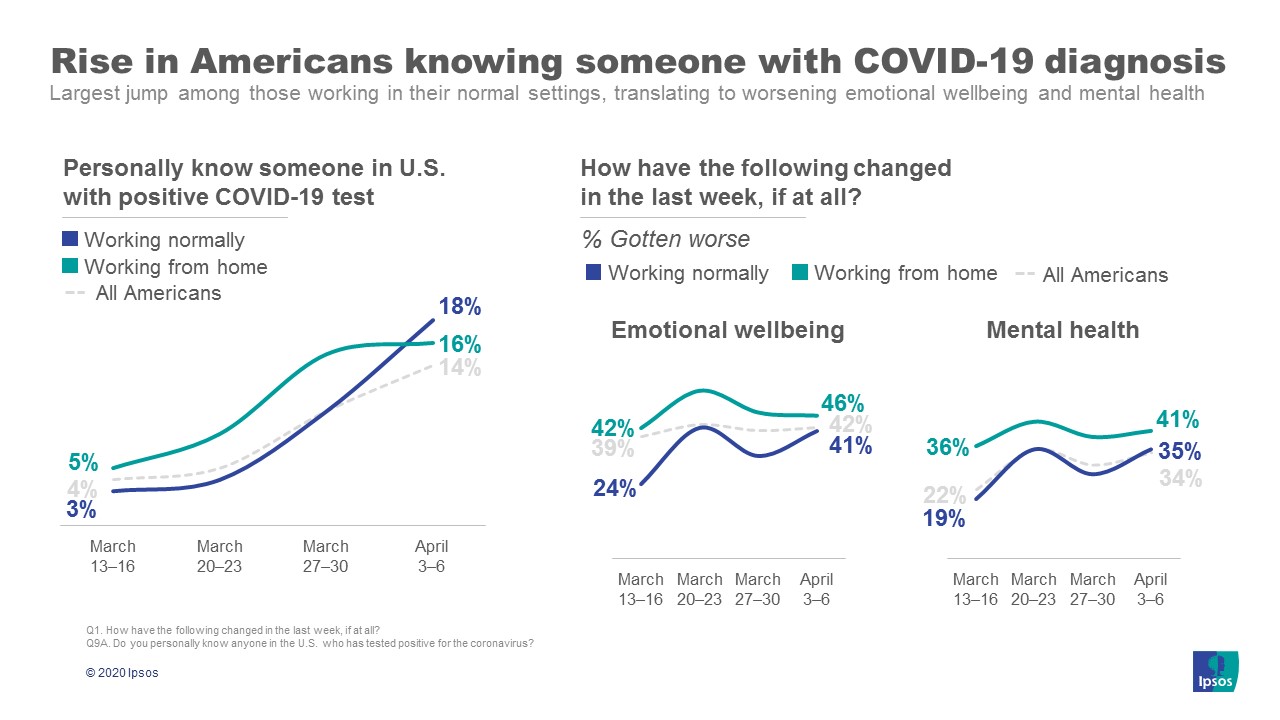
3. Anxiety levels around the coronavirus continue to climb as people adjust to the new circumstances. However, relatively few report acute financial challenges for the moment.
- 47% of working adults report that their ability to effectively do their jobs has gotten worse over the past few weeks.
- About 1 in 5 (19%) say their ability to pay rent or their mortgage has worsened over the last few weeks and a quarter (26%) say their ability to afford household goods has worsened.
Washington, DC, April 1, 2020
The third week of the Axios/Ipsos Coronavirus Index finds that over half of Americans are self-quarantining and concern about the pandemic continues to increase as people adjust to the new normal.
Detailed Findings
1. Over half of Americans, or about 175 million people, say they are self-quarantining as in-person social contact continues to dwindle.
- This week 53% of Americans tell us they are self-quarantining, up from 39% last week and 10% two weeks ago.
- In-person social contact continues to decline with only 13% reporting ‘going out to eat’ (down from 25% last week and 56% two weeks ago) or 23% visiting friends or relatives (down from 32% and 48% two weeks ago).
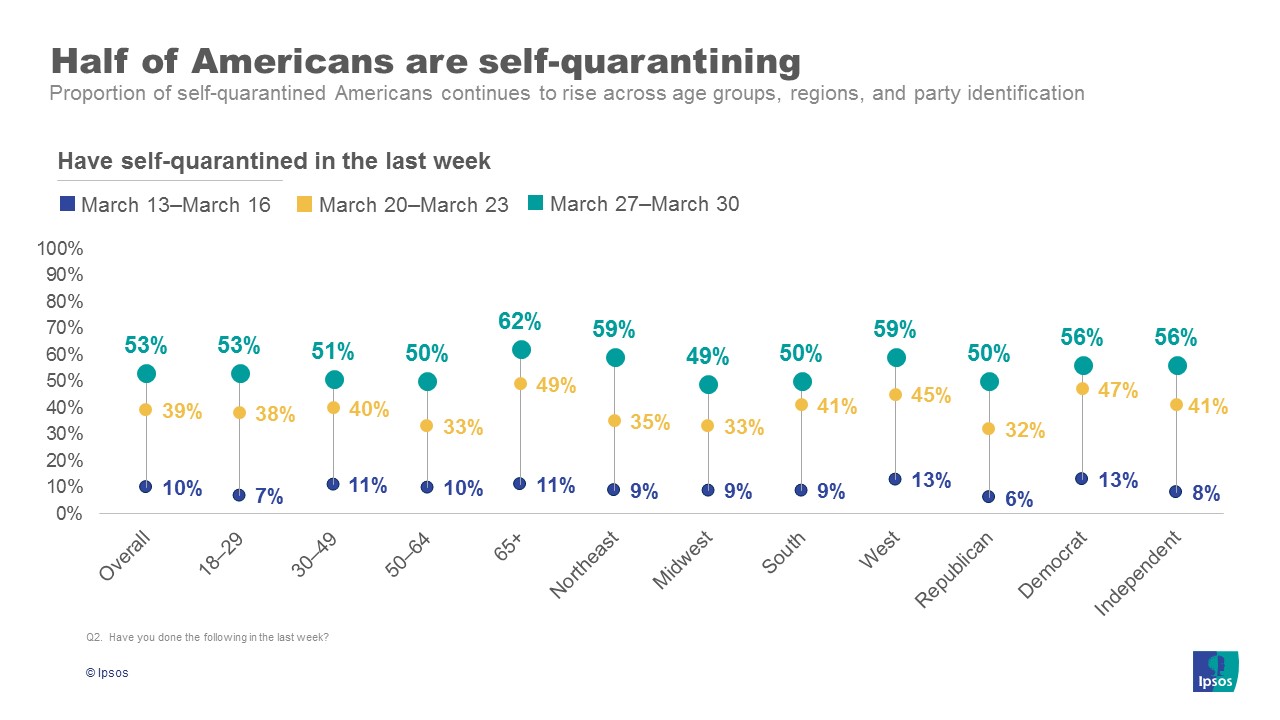
2. The sudden shift to the American workforce appears to be, at the moment, stabilized.
- From last week, roughly equivalent numbers reporting being told to work from home (42% vs 40% last week), their employer shutting down (16% vs 18% last week), or being furloughed (20% vs 22% last week).
- 9% of (formerly) employed respondents report being laid off.
- Likewise, the number who report their employers shutting down has almost doubled (to 16% from 10%) as has the number being furloughed or otherwise told not to work (to 20% from 10%).
3. Americans appear to be adapting to the new normal of the coronavirus pandemic with stability on mental health and work efficiency measures.
- Slightly fewer Americans report worsening mental health compared to last week (30% worse vs 35% last week) and emotional well-being (37% from 43% last week), while worsening physical health has remained stable (at 14%).
- Among working adults, about the same number report worsened ability to do their jobs compared to last week (43% vs 44%).
- The worst of supply chain shocks appear to be last week as the number attempting, but failing to buy basic foods (at 18% from 23% last week) or toilet paper (at 34% from 37% last week) has stabilized.
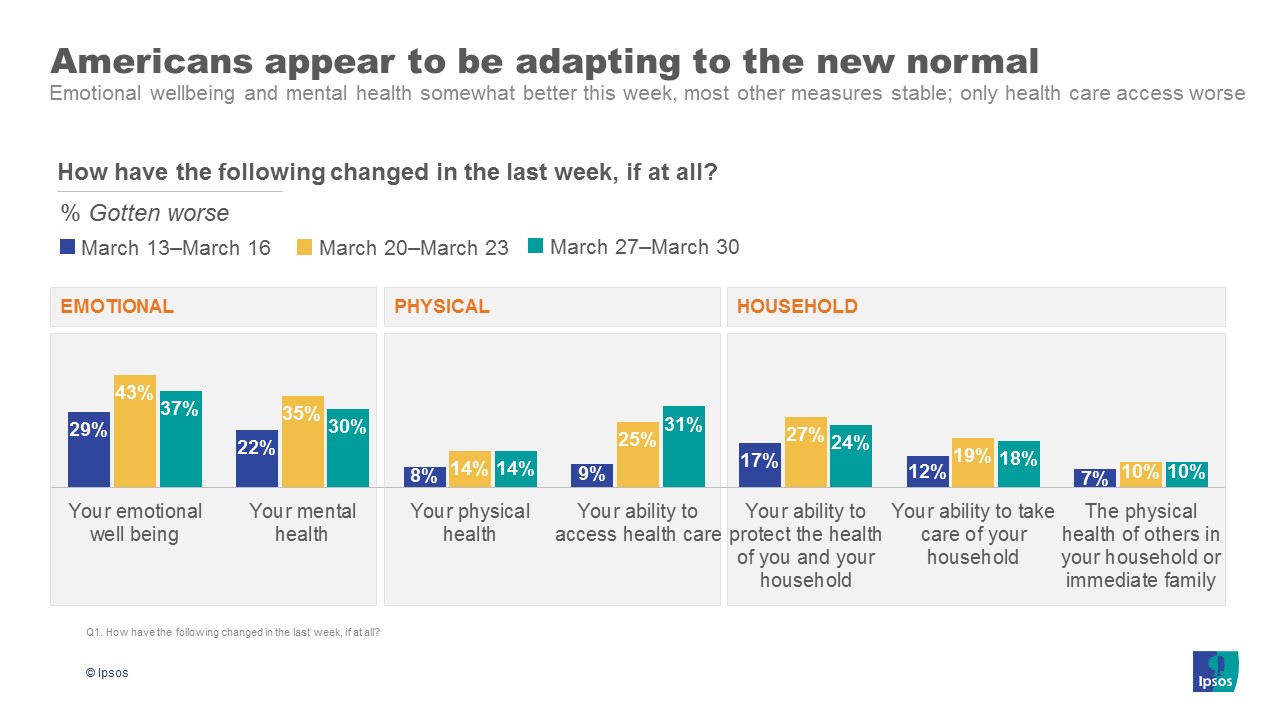
Washington, DC, March 24, 2020
The second week of the Axios/Ipsos Coronavirus Index finds that the number of Americans self-quarantining and working remotely have spiked in just one week, as anxiety around the outbreak increases.
Detailed Findings
1. Over the last week, Americans have sharply increased their social distancing practices.
- The number of Americans who say they are self-quarantining has almost quadrupled, up to 39% this week (fielded March 20-23) versus only 10% this time last week (March 13-16).
- Many more have also stopped attending large gatherings (74% now, from 46%) or canceled travel (48% now, from 30%).
- Americans also report reducing social contact such as going out to eat (down to 25% from 56% last week) or visiting friends (down to 32% from 48%).
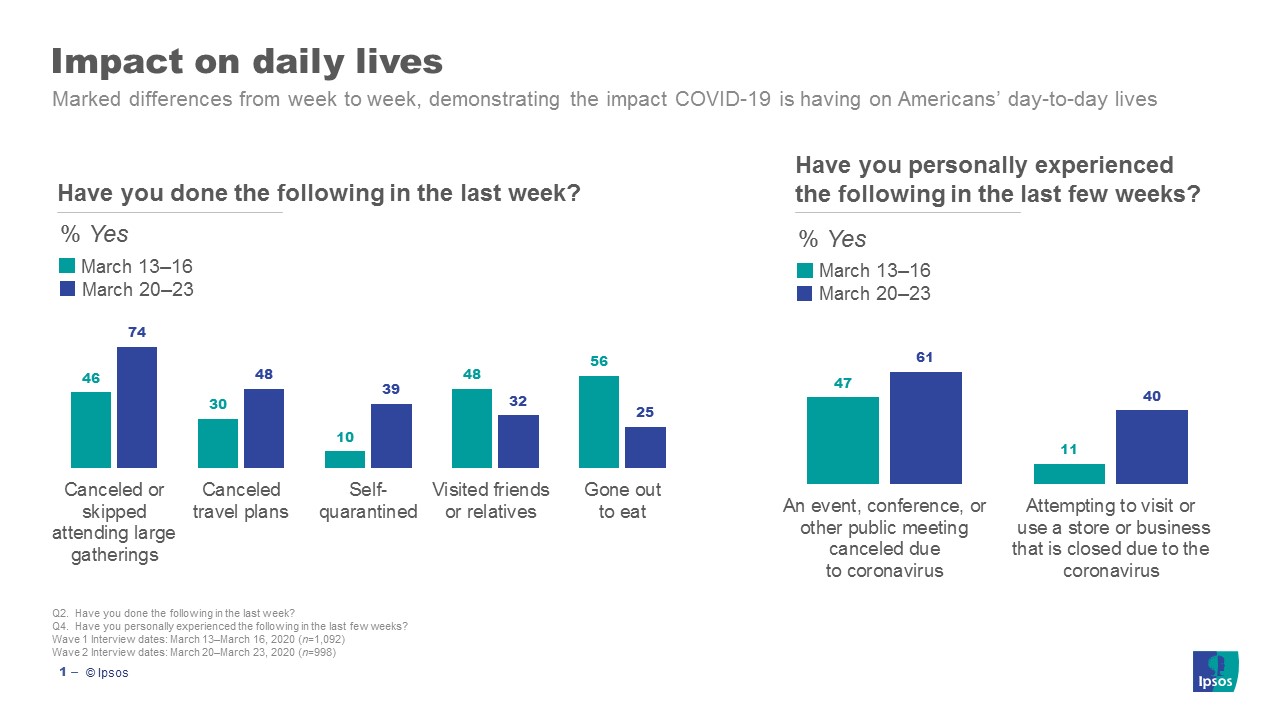
2. Likewise, the in-person workforce is rapidly shrinking as Americans either move to work from home or not working
- Among working Americans, the number who report being told to work from home has doubled, up to 40% from 21% last week.
- Likewise, the number who report their employers shutting down has almost doubled (to 18% from 10%) as has the number being furloughed or otherwise told not to work (to 22% from 10%).
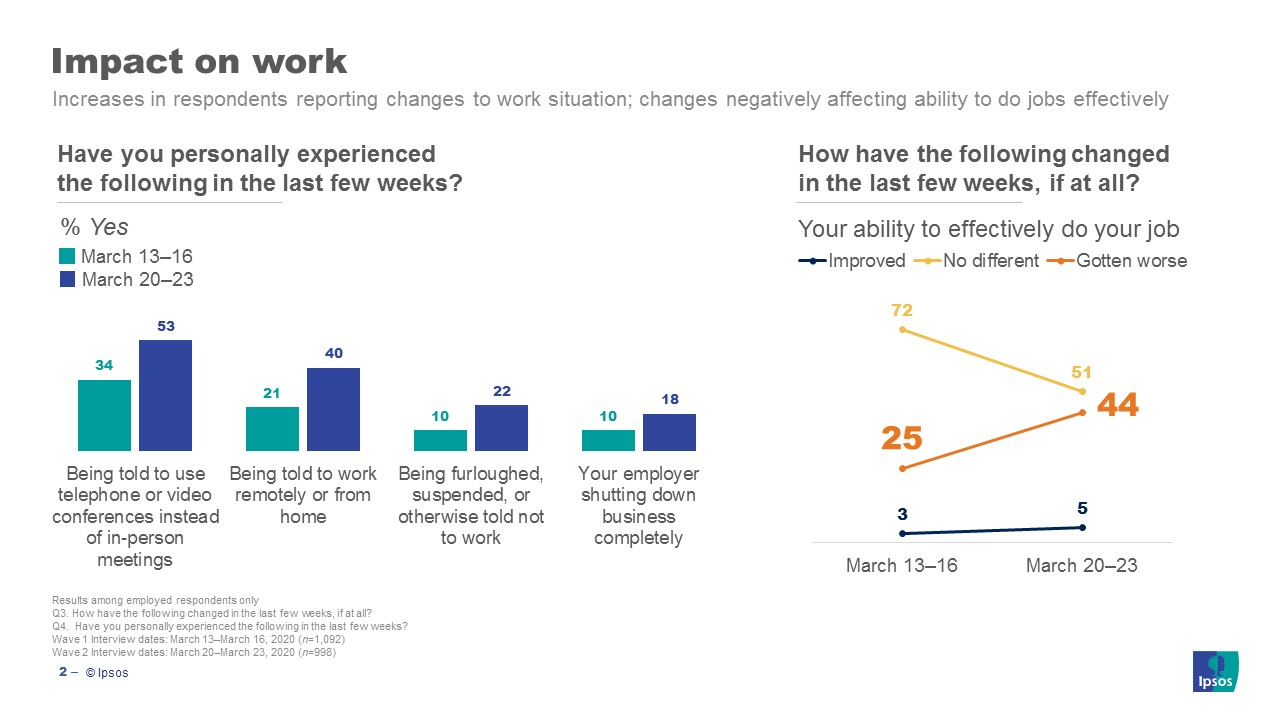
3. Though the widespread effects on public health remain to be felt, the outbreak has already started to impact emotional and mental health.
- Virtually all (90%) Americans are concerned about the coronavirus outbreak, including 59% who are very concerned.
- Sharply increased numbers of Americans report worsening mental health (35% worse vs 22% last week) and emotional well-being (43% from 29%), while physical health has posted less significant changes (to 14% from 8%).
Washington, DC, March 17, 2020
The inaugural Axios/Ipsos Coronavirus Index – a weekly tracking survey fielded on the Ipsos KnowledgePanel – finds that while Americans are highly concerned about the COVID-19 outbreak, many are slow to shift behaviors that may contribute to the virus’s spread.
This survey, fielded March 13-16, 2020, as the American public started to come to grips with the severity of COVID-19, finds that while 79% are concerned about the outbreak, 56% went out to eat and 48% visited friends in the last week.
However, there are signs that the public is responding to expert guidance to create ‘social distance.’ Nearly half (46%) report skipping large gatherings, 64% say they have stopped shaking hands, and 93% are washing their hands for the recommended 20 seconds. Additionally, 10% of the public say they are ‘self-quarantining’ and avoiding contact with others.
The findings of this study are more stark on the professional front, with 21% of working respondents reporting that they have been told to work remotely and 10% saying their employers have shut down completely.

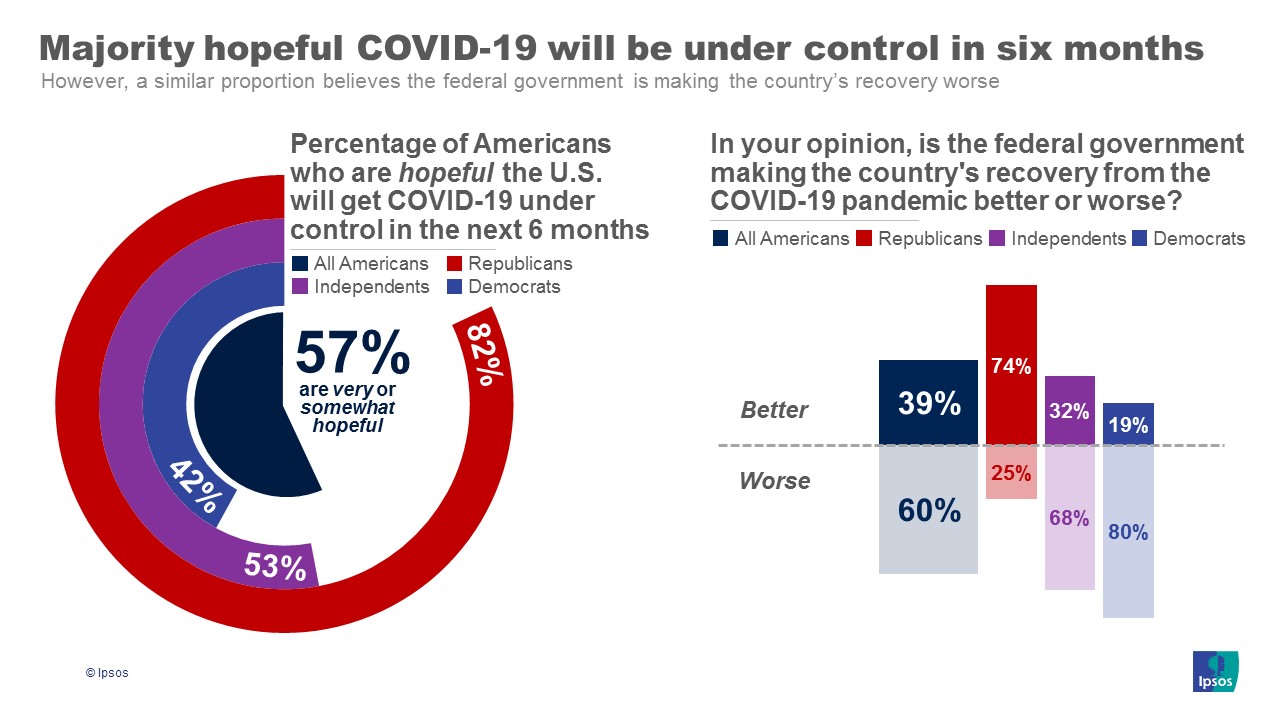













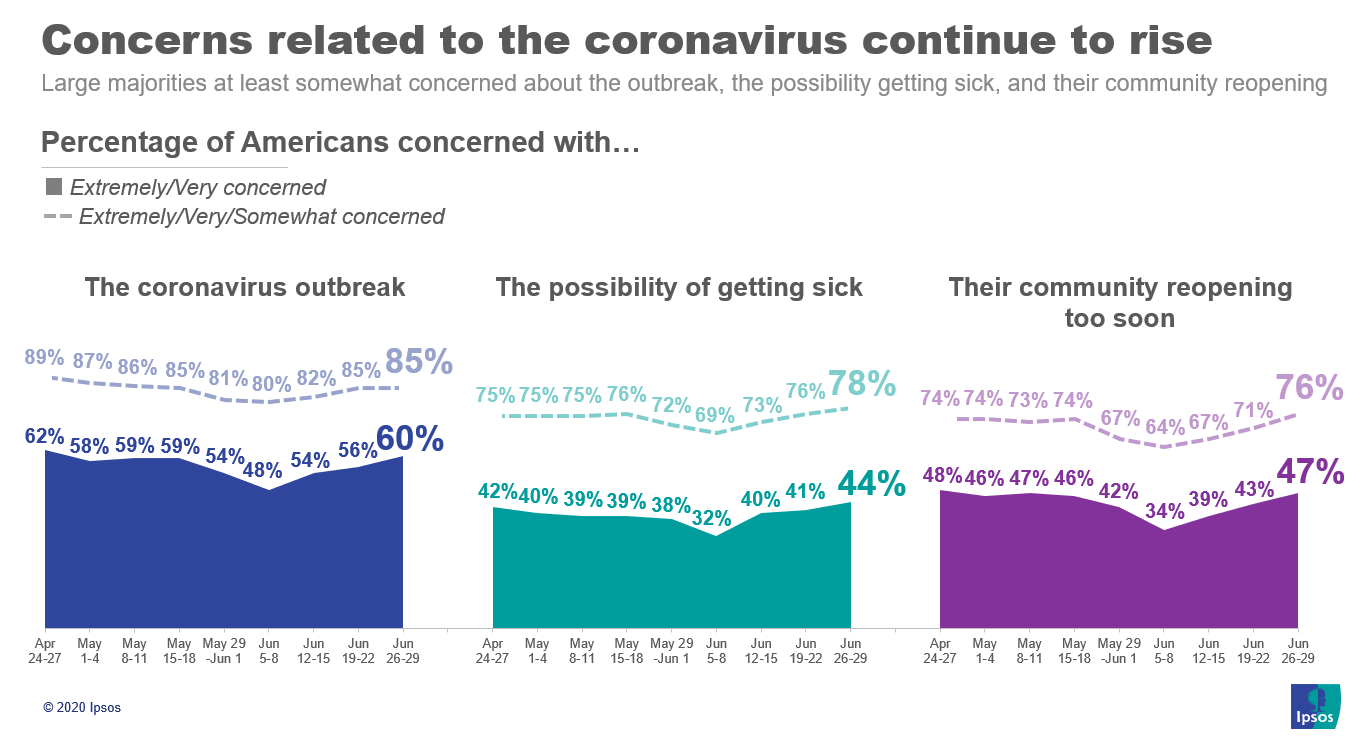
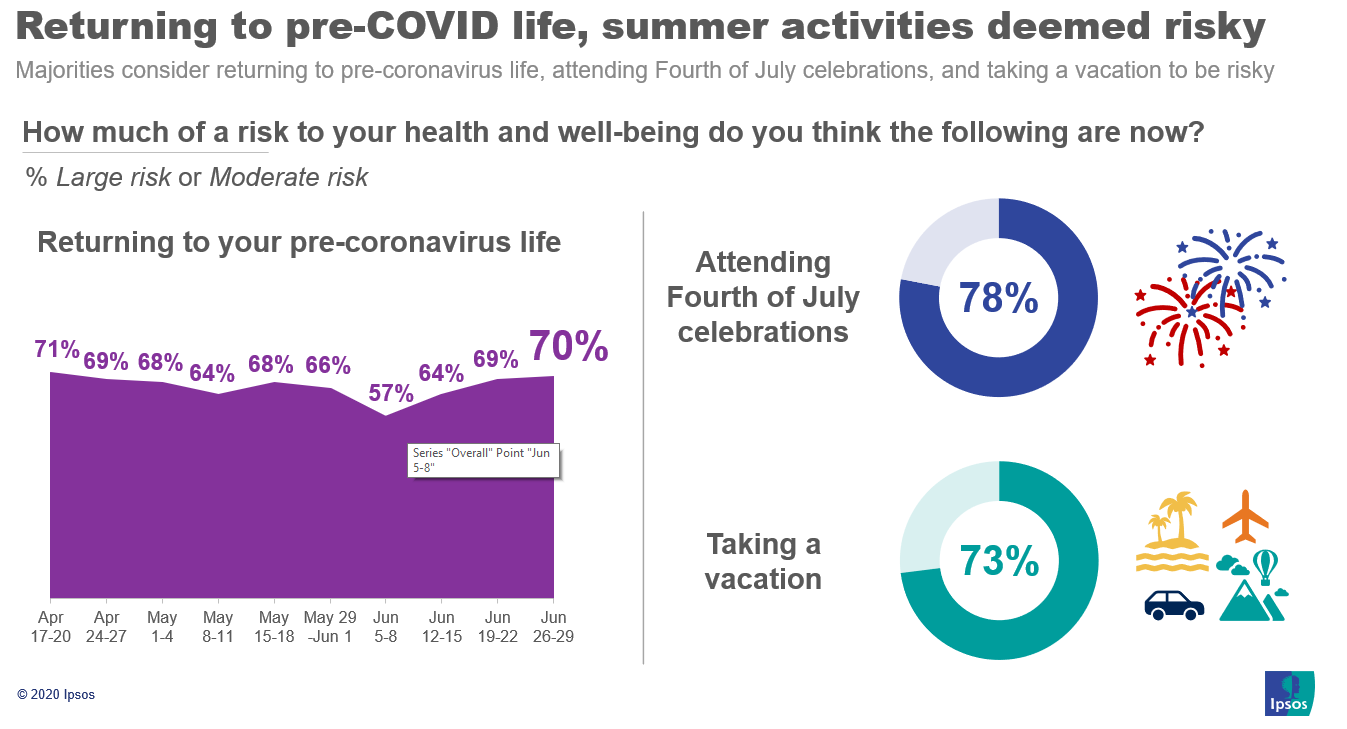


































0 comments:
Post a Comment